Spring Summer 2023

1 Raving Wark 2 Fly-Fishing Schaberg 3 Running Freeman 4 Juggling Sinclair 5 The Latinx Guide to Graduate School Negrón-Gonzales and Barrera 5 The Autocratic Academy Kaufman-Osborn 6 On Learning to Heal Cohen 7 Mendings Sweeney 8 The Williamsburg Avant-Garde Bradley 9 Puta Life Rodr íguez 10 The Force of Witness Fregoso 11 Rising Up, Living On Walsh 12 Dissident Practices Calirman 13 Spirit in the Land Schoonmaker 14 Curating the Moving Image Nash 14 Screening Social Justice Ortner 15 Glyphosate and the Swirl Adams 16 Being Dead Otherwise Allison 17 El Monte Cabrera 18 Strolling in the Ruins Smith 18 Hidden Histories Moultrie 19 Circuits of the Sacred Decena 19 Crip Genealogies Chen, Kafer, Kim, and Minich 20 Crip Colony Coráñez Bolton 20 Activist Affordances Dokumacı 21 Riotous Deathscapes Canham 21 Death’s Futurity Aranke 22 Insignificant Things Rarey 22 To Be Nsala’s Daughter Rivers 23 Don’t Look Away Cohen
23 The Media Swirl Vernallis 24 Uncomfortable Television Hargraves 24 The Virus Touch Ghosh 25 Working Musicians Taylor 25 Cooling the Tropics Hobart 26 Eating beside Ourselves Paxson 26 The Spectacular Generic Hayden 27 Arc of Interference Biehl and Adams 27 Infertile Environments Lamoreaux 28 River Life and the Upspring of Nature Khan 28 Composing Violence Chatterjee 29 Probing Arts and Emergent Forms of Life Fischer 29 Hailing the State Mitchell 30 Sovereignty Unhinged Thomas and Masco 30 When Forests Run Amok Ruiz-Serna 31 Unknowing and the Everyday Golestaneh 31 Waste Works Chalfin 32 A Vital Frontier Muehlebach 32 Multispecies Justice Celermajer and Chao 33 Hard Luck and Heavy Rain Russo 33 Going Underground Cohen 34 Disappearing Rooms Casta ñeda 34 Capitalist Humanitarianism Hulsether 35 Invited to Witness Kelly 35 Between Banat Shomali 36 Gendered Fortunes Korkman
36 Semiotics of Rape Oza 37 Kids on the Street Plaster 37 The Queer Art of History Evans 38 Queer and Trans Dialectology McCleary and Kibbey 38 The Specter of Materialism Liu 39 Envisioning African Intersex Swarr 39 The Science of Sex Itself Kahan and LaFleur 40 Sexuality and the Rise of China Kong 40 The Sports Issue Jones and Travers 41 Trafficking in Antiblackness Beutin 41 Siting Postcoloniality Cheah and Hau 42 Beauty Regimes Clutario 42 Postcolonial Configurations Diaz 43 Biopolitics, Geopolitics, Life Dietrich and Knopf 43 Since Time Immemorial Yannakakis 44 The Social Sciences in the Looking Glass Fassin and Steinmetz 44 The Prescription-to-Prison Pipeline Smirnova 45 The Briny South Boer 45 Letterpress Revolution Ferguson 46 White Enclosures Rexhepi 46 Critical AI Raley and Rhee 47 From Crisis to Catastrophe Feldman and Mufti 47 Journals 50 Selected Backlist
ON THE COVER Berna Reale, Palomo, 2012, performance. Courtesy of the artist and Galeria Nara Roesler, São Paulo, Rio de Janeiro, and New York.
dukeupress.edu contents
Raving
 MCKENZIE WARK
MCKENZIE WARK
“Passionately exploring queer rave culture, Raving is the fantasy and the moment. There are drugs and sex, tangled love affairs, rejection, the highs and lows of the dance floors, and all the messiness that makes up a rave evening. A potent book.” madison moore, author of Fabulous: The Rise of the Beautiful Eccentric
“How to write a book about raving as a practice that practices rave? From k-nights spent on Brooklyn’s and Berlin’s junkspace dance floors, McKenzie Wark abstracts a life practice of ressociation in a dance of autoconceptualization and allotheorization. In crossing toward the stranger’s gift of ‘letting go of ourselves as private property,’ Raving is nothing less than Wark’s femmunist manifesto, her tractatus on techno’s blackness, her treatise for a twenty-first-century trans ethics.”— KODWO ESHUN, author of More Brilliant than the Sun: Adventures in Sonic Fiction
“McKenzie Wark has done it again! With her personal journey into questioning the foundations of everything from how capitalism works to the way our bodies and very identities are under radical transformation, Wark breaks it all down. A must-read for those who are interested in the evolution of digital music and the way it has reshaped the world around us.”— PAUL D. MILLER , aka DJ Spooky, author of Rhythm Science
What is an art of life for what feels like the end of a world? In Raving McKen zie Wark takes readers into the undisclosed locations of New York’s thriving underground queer and trans rave scene. Techno, first and always a Black music, invites fresh sonic and temporal possibilities for this era of diminish ing futures. Raving to techno is an art and technique at which queer and trans bodies might be particularly adept but which is for anyone who lets the beat seduce them. Extending the rave’s sensations, situations, fog, lasers, drugs, and pounding sound systems onto the page, Wark invokes a trans practice of raving as a timely aesthetic for dancing in the ruins of this collapsing capital.
PRACTICES


Announcing a new series

Practices
Edited by MARGRET GREBOWICZ

Books in the Practices series are for real-life hobbyists, dev otees, and enthusiasts. They are by and about amateurs in the original sense—those who engage in pursuits out of sheer love and fascination. Practices books show how an ordinary activity like fishing, running, or juggling helps us come to understand ourselves and the world around us. Sleek and incisive, they reveal the pleasures of losing oneself in doing anything that holds sway over us, no matter how common or minor it might seem. They map new places inside us. Practices books will intrigue and challenge an activity’s most ardent practitioners as well as those who never considered their appeal.
March 136 pages, 26 color illustrations, 5”x7” paper, 978-1-4780-1938-1 $15.95tr/£13.99 cloth, 978-1-4780-1676-2 $84.95/£76.00
Philosophy for Spiders
On the Low Theory of Kathy Acker paper, $21.95/£18.99 978-1-4780-1468-3 / 2021

philosophy forspidersonthe lowtheoryofkathyacker mckenzie
wark
Trans studies/Music
A series edited by Margret Grebowicz
McKenzie Wark is the author of Capital Is Dead, Re verse Cowgirl, and The Beach beneath the Street, among other books.
1
Also by McKenzie Wark
March 112 pages, 3 illustrations, 5”x7” paper, 978-1-4780-1936-7 $15.95tr/£13.99 cloth, 978-1-4780-1672-4 $84.95/£76.00
Fly-Fishing


CHRISTOPHER SCHABERG
“Fly-Fishing is about what Schaberg calls small-fishing—the kind done close to home for species that don’t necessarily make the glamour list. But like this deceptively simple pursuit, the book itself is much deeper and more layered than the humble title might indicate. With beautiful descriptive language and plenty of introspection, Schaberg’s story is about more than just fishing—it’s about time, the world, and our place in both.”— DYLAN TOMINE , author of Headwaters: The Adventures, Obsession, and Evolution of a Fly Fisherman
“Fusing memoir and reflection, Schaberg’s lovely book meanders like a treasured northwoods stream through themes of friendship, loss, and wonder. Here, often hipdeep with the narrator in a hidden lake surrounded by cattails, we become tuned ‘into things beyond [us]—and not to master them but to merely coexist here.’”
CHRIS

DOMBROWSKI, author of The River You Touch: Making a Life on Moving Water
“[A] short but sweet meditation on the art of fly-fishing. [Schaberg’s] musings are epi sodic and sharp. . . . This roving outing lands.”— Publishers Weekly

In Fly-Fishing, Christopher Schaberg ponders his lifetime pursuit of the widely mythologized art of fly-fishing. From the Michigan lakeshore where he learned to fish to casting flies in a New Orleans bayou, Schaberg sketches landscapes and fish habitats and shows how fly-fishing allows him to think about coexisting with other species. It offers Schaberg a much-needed source of humility, social isolation, connection with nature, and a reminder of environmental degradation. Rather than centering fishing on trophies, conquest, and travel, he advocates for a “small-fishing” that values catching the diminutive fish near one’s home. Introspective and personal, Fly-Fishing demonstrates how Schaberg’s obsession indelibly shapes how he understands and lives in the wider world.

PRACTICES
A series edited by Margret Grebowicz
From Fly-Fishing
It takes me six minutes to walk to Bayou St. John, near my home in Mid-City New Orleans. I walk there to fish the end of the bayou, a cement-lined channel about thirty feet across, greenish water and occasional birdlife in residence: mangy blue herons, a solitary sandpiper, a roving pelican, sometimes an osprey. Among these creatures I scout for small fish in the murky shallows, cast ing surface bugs and darting streamers when I see signs of fish. . . . The whole practice is at once heightened and deemphasized, focused and decentered. Coming off my Michigan summer, though, and teaching through an ongoing pandemic, this daily hour-long pursuit has kept me sane. . . . When I fish in Michigan, I look for structure: reeds, submerged logs, lily pads. Here I find myself targeting the floating forms of face masks, pill bottles, and deflated soccer balls. I cast toward murky shapes in four feet of water, and the edge of the sloped cement embankment, where fish hang out. Adjust to your environs.
Fishing/Outdoors
Christopher Schaberg is Dorothy Harrell Brown Dis tinguished Professor of English at Loyola University New Orleans.
2
Running
Running



LINDSEY A. FREEMAN
“This is not your average handbook on running. It is far more incisive, far more tender, far more uncanny—and reading it will make you rethink what you know about an activity all of us at one time or another have pursued, resisted, witnessed, or even loved. Lindsey A. Freeman shows us that far from a solitary pursuit, running is about connecting to ourselves and each other. From the amateur to the Olympian and from the bodily to the transcendental, there is so much she both celebrates and scrutinizes. And in true handbook fashion, Hazel Meyer’s delightful, ludic illustrations provide the perfect running companion.”— MARK YAKICH , author of Football


In Running, former ncaa Division I track athlete Lindsey A. Freeman pres ents the feminist and queer handbook of running that she always wanted but could never find. For Freeman, running is full of joy, desire, and indul gence in the pleasure and weirdness of having a body. It allows for a space of freedom—to move and be moved. Through tender storytelling of a lifetime wearing running shoes, Freeman considers injury and recovery, what it means to run as a visibly queer person, and how the release found in running comes from a desire to touch something that cannot be accessed when still. Running invites us to run through life, legging it out the best we can with heart and style.
PRACTICES
A series edited by Margret Grebowicz
From Running
All runners have a few races like my middle school mile relay final, races that they feel define them as a runner and by exten sion clarify them as a person, both to themselves and to others. It wasn’t a good idea to run in the second lane, which meant that I was running a slightly longer distance than my opponent, and it wasn’t smart to set out at a full sprint. If I had been faster or run a better race, made ground more slowly, slotted myself behind the front-runner in the first lane and let her take the drag of the wind, and then chosen one moment to pass and kick, we might have won, but I had no mind for strategy then. And even now, although I dream of a controlled elegance, if I’m honest, my default mode takes the shape of ragged will. Thirty years later I can still feel this race, the wild pain of pushing my body to collapse and the warm presence of the other runner on my left, wanting the same thing I wanted: to finish, to win, to move those watching, to make contact with each other, with ourselves and the world, to touch and be touched.
March 160 pages, 20 illustrations, 5”x7” paper, 978-1-4780-1965-7 $15.95tr/£13.99 cloth, 978-1-4780-1701-1 $84.95/£76.00
3
Lindsey A. Freeman is Associate Professor of Sociol ogy at Simon Fraser University.
March 160 pages, 20 illustrations, 5”x7” paper, 978-1-4780-1960-2 $15.95tr/£13.99 cloth, 978-1-4780-1696-0 $84.95/£76.00
Juggling STEWART LAWRENCE SINCLAIR
“Describing juggling as a hobby, an obsession, and a world, Stewart Lawrence Sinclair pulls us deeper and deeper into not just the world of the juggler but the mind of the juggler. Juggling is great catchy fun and way deeper than I expected.”
 ANDER MONSON, author of Predator: A Memoir, A Movie, an Obsession
ANDER MONSON, author of Predator: A Memoir, A Movie, an Obsession
In Juggling, Stewart Lawrence Sinclair explores the four-thousand-year history and practice of juggling as seen through his life as a juggler. Sin clair—who learned to juggle as a child and paid his way through college by busking—shares his experiences of taking up juggling after an episode of suicidal ideation, his time juggling on the streets, and ultimately finding comfort in juggling during the COVID-19 pandemic. In many ways, this is a book about loss and recovery. From his own juggling story to clowns braving military checkpoints in Bosnia and Rwanda to perform in refugee camps to contemporary avant-garde performances, Sinclair shows how the universal language of juggling provides joy as well as a respite from difficulties during hard times.


PRACTICES
A series edited by Margret Grebowicz

Stewart Lawrence Sinclair is a writer and editor whose essays, reportage, and narrative nonfiction have been featured in LitHub, Guernica, New Orleans Review, Creative Nonfiction’s True Story, and elsewhere. He teaches creative writing at the City College of New York and juggles whenever he can.

From Juggling
I never know what makes people stop to watch me, approach me, buy me whiskey, tell me their story. I suspect people come across someone like me juggling in the street, and if they pay any attention at all, they get lost in the strange amalgam of skill and nonsense that constitutes this craft—and maybe that’s what makes them want to tell a stranger about themselves. Whatever it is, years of incidental connections have rendered me almost incapable of denying people a show. It’s that inability to juggle for juggling’s sake that led me, for years, to relegate my props to the closet. That is, until the lockdown. Now, once again, I’m juggling while the world burns, trying to maintain, sometimes inadver tently helping someone else do the same.
Juggling
4
Higher education/Latinx studies
The Latinx Guide to Graduate School
GENEVIEVE NEGRÓN-GONZALES and MAGDALENA L. BARRERA
In The Latinx Guide to Graduate School Genevieve Negrón-Gonzales and Magdalena L. Barrera provide prospective and current Latinx graduate students in the humanities and social sciences with a roadmap for surviving and thriving in advanced degree programs. They clearly document the unwritten rules of graduate education that impact Latinx students, demystifying and clarifying the essential requirements for navigating graduate school that Latinx students may not know because they are often the first in their families to walk that path. Topics range from identifying the purpose of graduate research, find ing the right program, and putting together a strong application to developing a graduate student identity, cultivating professional and personal relationships, and mapping out a post–graduate school career. The book also includes resources for undocumented students. Equal parts how-to guide, personal reflection, manifesto, and academic musing, this book gives a culturally resonant perspective that speaks to the unique Latinx graduate student experience.
Genevieve
Magdalena L. Barrera is Vice Provost for Faculty Success at San José State University.
Higher education
The Autocratic Academy Reenvisioning Rule within America’s Universities TIMOTHY V. KAUFMAN-OSBORN

Critics of contemporary US higher education often point to the academy’s “corporatiza tion” as one of its defining maladies. However, argues Timothy V. Kaufman-Osborn in The Autocratic Academy, American colleges and universities have always been organized as corporations in which the power to rule is legally vested in and monopolized by antidemo cratic governing boards. This institutional form, Kaufman-Osborn contends, is antithetical to the free inquiry that defines the purpose of higher education. Tracing the history of the American academy from the founding of Harvard (1636), through the Supreme Court’s Dartmouth v. Woodward ruling (1819), and into the twenty-first century, Kaufman-Osborn shows how the university’s autocratic legal constitution is now yoked to its representation on the model of private property. Explaining why appeals to the cause of shared governance cannot succeed in wresting power from the academy’s autocrats, Kaufman-Osborn argues that American universities must now be reincorporated in accordance with the principles of democratic republicanism. Only then can the academy’s members hold accountable those chosen to govern and collectively determine the disposition of higher education’s unique public goods.
The Latinx Guide to Graduate s chool
March 280 pages paper, 978-1-4780-1967-1 $26.95tr/£22.99 cloth, 978-1-4780-1703-5 $99.95/£90.00
The Autocratic Academy
Reenvisioning Rule within America’s Universities
April 352 pages, 2 illustrations paper, 978-1-4780-1982-4 $28.95/£24.99 cloth, 978-1-4780-1712-7 $104.95/£94.00
Negrón-Gonzales is Associate Professor of Education at the University of San Francisco and coeditor of We Are Not Dreamers: Undocumented Scholars Theorize Undocumented Life in the United States, also published by Duke University Press.
volando alto sin olvidar de donde vengo P araMi
dad THAN K YOU DRE A MER
¡SÍSE PUDO! Genevieve n e G rón-Gonzales and MaG dalena l Barrera
Timothy V. Kaufman-Osborn is Baker Ferguson Professor of Politics and Leadership Emeritus at Whitman College and author of From Noose to Needle: Capital Punishment and the Late Liberal State and Creatures of Prometheus: Gender and the Politics of Technology.
Comuni
volandoalto sinolvidar dedonde vengo
Timothy V. Kaufman-Osborn
5
On Learning to Heal
or,
What Medicine Doesn’t Know
Ed Cohen
January 240 pages paper, 978-1-4780-1932-9 $25.95tr/£21.99 cloth, 978-1-4780-1667-0 $99.95/£90.00
Health/Medical anthropology

On Learning to Heal or, What Medicine Doesn’t Know ED COHEN
“On Learning to Heal is the memoir-cum medical philosophy of an intellectual with a humiliating chronic illness and his ultimately successful attempt to find a way of being both inside and outside his disease. It follows his struggles first to manage his illness and then to live with it, until finally he turns his attention to the so much that was working in his body—breathing, moving, being. What Cohen wants us to know is that if we are alive, then there is health within us. If his ideas were followed, you would be tuned instead to what is working in your body and not to what is not working, and you might find very little wrong with you and much that is right with you.”
VICTORIA
SWEET, author of Slow Medicine: The Way to Healing

“With touching and incisive autobiographical accounts, Ed Cohen leads readers on a journey through his own entangling of bodily experience in relation to the limitations of modern medical thought. Part captivating story about his experience with and recovering from a devastating illness and part history and critique of the biomedical models that failed to fully comprehend his disease, On Learning to Heal is a compel ling and beautiful book.”— VINCANNE ADAMS, author of Glyphosate and the Swirl: An Agroindustrial Chemical on the Move
At thirteen, Ed Cohen was diagnosed with Crohn’s disease—a chronic, incur able condition that nearly killed him in his early twenties. At his diagnosis, his doctors told him that the best he could hope for would be periods of remission. Unfortunately, doctors never mentioned healing as a possibility. In On Learning to Heal, Cohen draws on fifty years of living with Crohn’s to con sider how Western medicine’s turn from an “art of healing” toward a “science of medicine” deeply affects both medical practitioners and their patients. He demonstrates that although medicine can now offer many seemingly mirac ulous therapies, medicine is not and has never been the only way to enhance healing. Exploring his own path to healing, he argues that learning to heal requires us to desire and value healing as a vital possibility. With this book, Cohen advocates reviving healing’s role for all those whose lives are touched by illness.
CRITICAL GLOBAL HEALTH: EVIDENCE, EFFICACY, ETHNOGRAPHY
Ed Cohen is Professor of Women’s, Gender, and Sex uality Studies at Rutgers University and author of A Body Worth Defending: Immunity, Biopolitics, and the Apotheosis of the Modern Body, also published by Duke University Press. He hosts a therapeutic practice for people interested in healing: healingcounsel.com.
A series edited by Vincanne Adams and João Biehl
Also by Ed Cohen
A Body Worth Defending Immunity, Biopolitics, and the Apotheosis of the Modern Body paper, $29.95/£25.99 978-0-8223-4535-0 / 2009

6
“
Mendings
MEGAN SWEENEY
Mendings is a beautiful, evocative, heart-rending book that has been written with care and craft. Courageously honest and self-revealing, Megan Sweeney’s narrative voice arrives with a startling immediacy. A daring, experimental, hybrid work of theory and meditation, Mendings is a relentless personal reflection and family memoir.”
TIYA MILES, author of All That She Carried: The Journey of Ashley’s Sack, a Black Family Keepsake
“Marrying memoir, family history, and a fresh and innovative understanding of the significance and function of women’s handiwork, Mendings is an intimate and cathartic book. With candor and sincerity, Megan Sweeney does the difficult work of coming to terms with a complicated family while allowing for a wider vision about how cloth ing, dress, redress, and mending might allow readers to understand their own family dynamics and forms of dress.”— KAREN ELIZABETH BISHOP, Associate Professor of Spanish and Comparative Literature, Rutgers University
Mendings tells an intimate story about family, selfhood, and the love and loss lodged in garments. In this narrative about making meaning of brokenness and grief, Megan Sweeney reflects on her childhood entanglement with her mother, her loss-filled relationship with her alcoholic father, and her attach ment to the clothes that have mended her as she has mended them. Sweeney explores how clothing fosters communication and enables us to cultivate relationships with ourselves and others, both living and deceased. In dialogue with other clothing lovers, writers, fiber artists, evolutionary biologists, his torians, and environmentalists, Sweeney also foregrounds the entwinement of clothing, race, and gender as she considers the ethics and environmental effects of clothing consumption, the history of clothing in the US prison system, and the roles that textiles play as sources of creativity, artistry, and self-fashioning even within conditions of constraint. For Sweeney, the act of mending is a way of living. Unlike fixing, which leaves no trace of damage or loss, mending allows Sweeney to embrace holes, rips, and threadbare patches as part of her life’s design.


1 2 3 4 5 6 7 8 9 10 11 12 13 14 15 16 17 18 19 20 21 22 23 24 25 26 27 28 29 30 31 32 33 34 35 36 37
Mendings
April 272 pages, 81 color illustrations, 7”x10” paper, 978-1-4780-1910-7 $26.95tr/£22.99 cloth, 978-1-4780-1646-5 $99.95/£90.00
Megan Sweeney is Arthur F. Thurnau Associate Pro fessor of English, Afroamerican and African Studies, and Women’s and Gender Studies at the University of Michigan, Ann Arbor. She is the author of Reading Is My Window: Books and the Art of Reading in Women’s Pris ons and editor of The Story Within Us: Women Prisoners Reflect on Reading
7 Memoir/Women’s studies/Fashion and textile studies
Megan Sweeney
THE WILLIAMSBURG AVANT-
GARDE
EXPERIMENTAL
MUSIC AND SOUND ON THE BROOKLYN WATERFRONT
The Williamsburg Avant-Garde
Experimental Music and Sound on the Brooklyn Waterfront CISCO BRADLEY
“With a sharp eye for detail and an awareness of broad cultural implications, Cisco Bradley has captured a clear image of an elusive moment, vividly chronicling an artistic movement and social scene as distinctive as it is historically significant. The Williamsburg he lays out is a staunchly alternative confederation of improvisers, per formance artists, painters, poets, and sculptors all united in their renegade stature. This is an authoritative book on a creative foment that has often gone unrecognized in the discourse around experimental music in New York.”— NATE CHINEN , author of Playing Changes: Jazz for the New Century
“Cisco Bradley compellingly guides readers through the successive adaptations of the experimental music community to a rapidly changing Williamsburg environment, from industrial graveyard to overpriced bohemia. In offering the first book-length account of the rich musical life in Williamsburg’s heyday, Bradley showcases experimental music while accentuating the life-and-death struggles of musicians in the face of creeping gentrification. This highly impactful book makes an excellent contribution to the literature on experimental music.”— BERNARD GENDRON, author of Between Montmartre and the Mudd Club: Popular Music and the Avant-Garde

April 400 pages, 50 illustrations paper, 978-1-4780-1937-4 $29.95tr/£25.99 cloth, 978-1-4780-1674-8 $109.95/£98.00

Cisco Bradley is Associate Professor of History at the Pratt Institute and author of Universal Tonality: The Life and Music of William Parker, also published by Duke Uni versity Press.
In The Williamsburg Avant-Garde Cisco Bradley chronicles the rise and fall of the underground music and art scene in the Williamsburg neighborhood of Brooklyn between the late 1980s and early 2010s. Drawing on interviews, archival collections, musical recordings, videos, photos, and other ephemera, Bradley explores the scene’s social, cultural, and economic dynamics. Build ing on the neighborhood’s punk diy approach and aesthetic, its free jazz, post punk, and noise musicians and groups—from Mary Halvorson, Zs, and Nate Wooley to Matana Roberts, Peter Evans, and Darius Jones—produced shows in a variety of unlicensed venues as well as in clubs and cafes. At the same time, pirate radio station free103point9 and music festivals made Wil liamsburg an epicenter of New York’s experimental culture. In 2005, New York’s rezoning act devastated the community as gentrification displaced its participants farther afield in Brooklyn and in Queens. With this portrait of Williamsburg, Bradley not only documents some of the most vital music of the late twentieth and early twenty-first centuries, he helps readers better understand the formation, vibrancy, and lifespan of experimental music and art scenes everywhere.
Also by Cisco Bradley
Universal Tonality
The Life and Music of William Parker paper, $29.95/£25.99 978-1-4780-1119-4 / 2021
Universal
Tonality
Cisco Bradley The Life and Music of William Parker
Music/Avant-garde art
Cisco Bradley
8
Puta Life
Seeing Latinas, Working Sex JUANA MARÍA RODRÍGUEZ
“In this beautifully crafted and impressive work, Juana María Rodríguez considers the range of biographical self-representations across various media that document and affirm the lives of sex workers who seek to make themselves knowable and known. The photos and stories read in this powerful text offer testimonies to their lives that resist any effort to efface or degrade their aging bodies and sexuality. Rodríguez brings heart into everything she writes here, expanding an understanding and capacity for work and love, for life and sorrow, and for those pleasures that emerge precisely from those sites where life is hardest.”— JUDITH BUTLER , author of The Force of Nonviolence: An Ethico-Political Bind
“Puta Life demonstrates why Juana María Rodríguez is the foremost theorist of Latina sexuality. Rodríguez cultivates a remarkable visual archive of putas, from nineteenth-century photographs to contemporary visual media, while writing of their ‘spectacular sexuality’ with care and adoration. A powerful and remarkable read, Puta Life is an essential study devoted to the vitality of Latina/x sexual laborers who work to affirm life against all odds.”— DEBORAH R. VARGAS, author of Dissonant Divas in Chicana Music: The Limits of La Onda
In Puta Life, Juana María Rodríguez probes the ways that sexual labor and Latina sexuality become visual phenomena. Drawing on state archives, illus trated biographies, documentary films, photojournalistic essays, graphic novels, and digital spaces, she focuses on the figure of the puta—the whore, that phantasmatic figure of Latinized feminine excess. Rodríguez’s eclec tic archive features the faces and stories of women whose lives have been mediated by the stigma and criminalization surrounding sex work—wash erwomen and masked wrestlers, porn stars and sexiles. Rodríguez examines how visual tropes of racial and sexual deviance expose feminine subjects to misogyny and violence, attuning our gaze to how visual documentation shapes perceptions of sexual labor. Throughout this poignant and personal text, Rodríguez brings the language of affect and aesthetics to bear upon understandings of gender, age, race, sexuality, labor, disability, and migration. Highlighting the criminalization and stigmatization that surrounds sex work, she lingers on those traces of felt possibility that might inspire more ethical forms of relation and care.

DISSIDENT ACTS
A
JUANA MARÍA R O DRÍGUEZ L I FE P U T A
SEEING LATINAS,
April 288 pages, 84 color illustrations paper, 978-1-4780-1949-7 $26.95/£22.99 cloth, 978-1-4780-1685-4 $99.95/£90.00
Juana María Rodríguez is Professor of Ethnic Studies, Performance Studies, and Gender and Women’s Studies at the University of California, Berkeley, and author of Sexual Futures, Queer Gestures, and Other Latina Long ings and Queer Latinidad: Identity Practices, Discursive Spaces

9 Latinx studies/Queer
theory/Sexuality studies
series edited by Macarena Gómez-Barris and Diana Taylor
WORKING SEX
THE FORCE OF / W ITNESS /
CONTRA FEMINICIDE
Feminist studies/Border studies
The Force of Witness Contra Feminicide ROSA-LINDA FREGOSO

“In this beautifully written and personal account, Rosa-Linda Fregoso succeeds in divesting the feminicides in Ciudad Juarez and elsewhere in the region of their individ ualizing spectacularity. The Force of Witness shows us how these violences intimately shape the lives of survivors, as they also reflect the heteropatriarchal dimensions of persisting structures of racial capitalism.”— ANGELA Y. DAVIS, Distinguished Pro fessor Emerita, University of California, Santa Cruz
“In this book Rosa-Linda Fregoso expresses the devastating experiences of suffering with a highly ethical and respectful approach. The resistance of women who have been wounded by feminicide is a lesson in love for life, since witnessing in The Force of the Witness is crucial in proving the atrocities of feminicide so that they are not forgotten. The Force of Witness thus restores the humanist sense that society has lost.”— PATRICIA RAVELO, Researcher and Professor, Centro de Investigaciones y Estudios Superiores en Antropología Social (ciesas)
April 242 pages, 26 illustrations paper, 978-1-4780-1981-7 $25.95/£20.99 cloth, 978-1-4780-1710-3 $99.95/£86.00
In The Force of Witness Rosa-Linda Fregoso examines the contra feminicide movement in Mexico and other feminist efforts to eradicate gender vio lence. Drawing on interviews, art, documentaries, and her years of activism, Fregoso traces the micro and macro scales of misogyny and the patterns of state complicity with gender violence. She shows how different forms of witnessing—from activist-mothers’ bearing witness to the memories of their daughters and expert witnesses in court cases to communal witnessing and a scholar-activist-citizen witnessing her own actions—are key to resisting feminicidal violence. Fregoso situates these forms of witness in the histories, contexts, structures, bodies, and intersectional struggles they emerge from. By outlining the complexities of feminicidal violence in relation to witness ing processes, Fregoso challenges the notion of witness as an individual or autonomous subject inscribed solely in the legal or religious arenas. Rather, she theorizes witness as a force of collectivity and a constellation of multiple social locations and intersectional practices that work together to abolish feminicidal violence.
Rosa-Linda Fregoso is Professor Emerita of Latin American and Latino Studies at the University of Cal ifornia, Santa Cruz, coeditor of Terrorizing Women: Feminicide in the Américas, also published by Duke Uni versity Press, and author of meXicana Encounters: The Making of Social Identities on the Borderlands

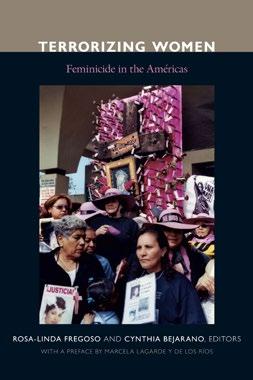
DISSIDENT ACTS
A series edited by Macarena Gómez-Barris and Diana Taylor
Also by Rosa-Linda Fregoso
Terrorizing Women Feminicide in the Américas paper, $29.95/£25.99 978-0-8223-4681-4 / 2010
ROSA-LINDA FREGOSO
10
Social theory/Feminist studies/Decolonial studies
Rising Up, Living On Re-Existences, Sowings, and Decolonial Cracks
 CATHERINE E. WALSH
CATHERINE E. WALSH
“Catherine E. Walsh’s heartfelt new book extends an important hemispheric bridge between the Americas and other parts of the globe. Sharing the thought and activism of Indigenous and Afrodiasporic peoples and conversing with US people of color and global feminist thought, she invites us to join across differences in a pragmatic politics of hope, unlearning the harmful while relearning how to sow, instead what is lifeaffirming as we walk toward greater justice and equity in the here and now.”
LAURA E. PÉREZ , author of Eros Ideologies: Writings on Art, Spirituality, and the Decolonial
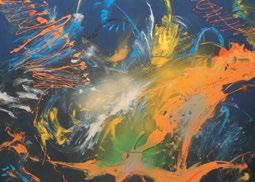
“Reporting on the contemporary global situation through the lens of decolonial theory while rethinking decolonial thought, Rising Up, Living On culminates in an urgent cry. With beautifully written prose that flows like refreshing water at the desert’s edge, it offers not only a rich array of theoretical insights, stories of resistances in the face of despair, and artistic representations but also portraits of different ways to live and think. Catherine E. Walsh is a major thinker.”— LEWIS R. GORDON, author of Fear of Black Consciousness
In Rising Up, Living On, Catherine E. Walsh examines struggles for existence in societies deeply marked by the systemic violences and entwinements of coloniality, capitalism, Christianity, racism, gendering, heteropatriarchy, and the continual dispossession of bodies, land, knowledge, and life, while reveal ing practices that contest and live in the cracks of these matrices of power. Through stories, narrations, personal letters, conversations, lived accounts, and weaving together the thought of many—including ancestors, artists, students, activists, feminists, collectives, and Indigenous and Africana peo ples—in the Americas, the Global South, and beyond, Walsh takes readers on a journey of decolonial praxis. Here, Walsh outlines individual and collective paths that cry out and crack, ask and walk, deschool, undo the nation-state, and break down boundaries of gender, race, and nature. Rising Up, Living On is a book that sows re-existences, nurtures relationality, and cultivates the sense, hope, and possibility of life otherwise in these desperate times.
ON DECOLONIALITY
A series edited by Walter D. Mignolo and Catherine E. Walsh
Also by Catherine E. Walsh (coauthored with Walter D. Mignolo)
On Decoloniality Concepts, Analytics, Praxis paper, $27.95/£23.99 978-0-8223-7109-0 / 2018
RISING UP, LIVING ON CATHERINE
ReExistences, Sowing
E. WALSH
February 344 pages, 8 illustrations paper, 978-1-4780-1952-7 $27.95/£23.99 cloth, 978-1-4780-1688-5 $104.95/£94.00
Catherine E. Walsh is Professor at the Universidad Andina Simón Bolívar in Ecuador and the author and editor of numerous books, including On Decoloniality: Concepts, Analytics, Praxis (with Walter D. Mignolo), also published by Duke University Press.

C a therine E Walsh Wa l ter D Mignolo C o n c e p t s An a l y tics a s On Dec O l O niality
11
s, an d De c o l o n i a l C r kca s
D I S S I DENT PR AC TICES
Brazilian Women Artists, 1960s–2020s
Art history/Latin American studies/Women’s studies


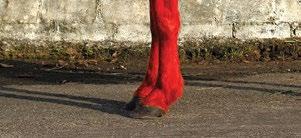

Dissident Practices
Brazilian Women Artists, 1960s–2020s

CLAUDIA CALIRMAN

“Claudia Calirman’s feminist perspective illuminates a wide range of recent Brazilian artists both emerging and established. Creatively conceived, clearly written, and com pellingly argued.”— JULIA BRYAN-WILSON, author of Fray: Art and Textile Politics
“Woven across time and artistic mediums, Dissident Practices provides a complex multivocal, intergenerational, and multidisciplinary art historiography of practices of creative resistance against all forms of subordination and oppression: gendered, political, social, racial, and artistic, from the perspective of singular women artists from Brazil. This is a country that has witnessed some of the most brilliant artists in the history of modern and contemporary art, but their memory has often been erased. This book—without being a survey, without unifying categorizations of gender or fem inism—provides a relational, open-ended, situated perspective of the powerful contri butions of Brazilian women to contemporary art, in the context of radical political and social conditions.”— CECILIA FAJARDO-HILL , art historian, curator, and writer in modern and contemporary Latin American art
In Dissident Practices, Claudia Calirman examines sixty years of visual art by prominent and emerging Brazilian women artists from the 1960s to the present, covering the period from the military dictatorship to the return to democracy in the mid-1980s, the social changes of the 2000s, the rise of the Right in the late-2010s, and the recent development of an overtly feminist art practice. Though they were lauded as key figures in Brazilian art, these artists still faced adversity and constraints because of their gender. Although many of them in the 1960s and 1970s disavowed the term feminism, Calirman gives a nuanced account of how they responded to authoritarianism, engaged with trauma in the aftermath of the military dictatorship, interrogated social gender norms, and fought against women’s objectification. By battling social inequalities, structures of power, and state violence, these artists create political agency in a society where women remain targets of brutality and discrimination.
Also by Claudia Calirman
Brazilian Art under Dictatorship Antonio Manuel, Artur Barrio, and Cildo Meireles paper, $25.95/£21.99 978-0-8223-5153-5 / 2012

12
Claudia Calirman is Associate Professor and Chair of the Department of Art and Music at John Jay College of Criminal Justice and author of Brazilian Art under Dicta torship: Antonio Manuel, Artur Barrio, and Cildo Meireles, also published by Duke University Press.
264 pages, 98 color illustrations paper, 978-1-4780-1940-4 $26.95tr/£22.99 cloth, 978-1-4780-1677-9 $99.95/£90.00
Claudia Calirman
April
Spirit in the Land
TREVOR SCHOONMAKER, editor

Spirit in the Land, which accompanies the art exhibition of the same name, examines today’s urgent ecological concerns from a fresh perspective. Through their artwork and writing, the artists show how cultural identity and traditions are deeply rooted in our relationship with the land, illustrate the restorative need to return to nature, and exemplify how biodiversity and cultural diversity are essential to our survival. The exhibition and catalogue center the voices of underrepresented artists, approaching ecological aware ness and environmental, social, and racial justice from the perspectives of the marginalized communities most negatively affected by today’s crises. Acting as environmental stewards, the artists reveal nature to be a reposi tory of cultural memory, a place of sanctuary, a contested site of resistance, and a source of spiritual nourishment. As land and water provide a sense of place and community, the exhibition aims to reconnect people to the nat ural world, illustrating our interdependence with all life on Earth. Spirit in the Land speaks to the urgency of today and projects a hopeful path for our future, where nature is cared for by humans, so that in turn nature may heal humanity.
Artists Terry Adkins, Firelei Báez, Radcliffe Bailey, Rina Banerjee, Christi Belcourt, María Berrío, Mel Chin, Andrea Chung, Sonya Clark, Maia Cruz Palileo, Annalee Davis, Tamika Galanis, Allison Janae Hamilton, Barkley L. Hendricks, Alexa Kleinbard, Hung Liu, Hew Locke, Meryl McMaster, Wangechi Mutu, Dario Robleto, Jim Roche, Kathleen Ryan, Sheldon Scott, Renée Stout, Monique Verdin, Stacy Lynn Waddell, Charmaine Watkiss, Marie Watt, Carrie Mae Weems, Peter Williams
The exhibition will be on view at the Nasher Museum of Art at Duke Univer sity from February 16 to July 9, 2023.
Publication of the Nasher Museum of Art at Duke University

Spirit in the Land
February 136 pages, 75 color illustrations, 7”x8.5” cloth, 978-0-938989-45-5 $29.95tr/£25.99
Also by the Nasher Museum of Art at Duke University
Pop América, 1965–1975 cloth, $39.95tr/£36.00 978-0-938989-42-4 / 2018

Southern Accent Seeking the American South in Contemporary Art paper, $49.95tr/£45.00 978-0-938989-38-7 / 2016
Trevor Schoonmaker is Mary D.B.T. and James H. Semans Director at the Nasher Museum of Art at Duke University. He is the author and editor of several exhibi tion catalogues, including Prospect 4: The Lotus in Spite of the Swamp, Southern Accent: Seeking the American South in Contemporary Art, and Wangechi Mutu: A Fan tastic Journey.
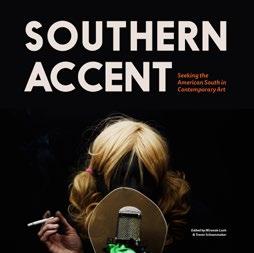
13 Art
April 408 pages, 110 color images paper, 978-1-4780-2044-8 $29.95tr/£25.99
Curating the Moving Image
 MARK NASH
MARK NASH
In Curating the Moving Image, influential curator and theorist Mark Nash draws on his work at Documenta11, the Venice Biennale, and elsewhere to explore the possibilities of contemporary curation. Constructing this richly illustrated book as a curatorial project in and of itself, Nash outlines several key concepts that range from exhibition architecture and curating as an affective and artistic practice to post-Cold War aesthetics and contemporary Chinese art. Throughout these essays on contemporary art, film, and installation, Nash offers critical commentary and reflection on exhibitions he has curated, including those that focus on socialist and utopian ideals following the end of the Cold War. He also folds curating into a discussion of forms of artistic production that are connected to alternative trajectories of collective and collaborative practice. Ultimately, Nash demonstrates that the art world and contemporary curatorial practice constitute some of the most important tools for social and aesthetic exchange in the twenty-first century.
Mark Nash is an independent curator, film historian, and filmmaker. He is Professor of Film and Digital Media and of History of Consciousness and cofounder with Isaac Julien of the Moving Image Lab at the University of California, Santa Cruz. He is also author of Screen Theory Culture and Experiments with Truth, and editor of Red Africa: Affective Communities and the Cold War. Nash worked closely with the late Okwui Enwezor on several large exhibitions including The Short Century and Documenta11 as well as the New Museum’s Grief and Grievance: Art and Mourning in America
Film/Anthropology

Screening Social Justice
Sherry B. Ortner
Screening Social Justice
Brave New Films and Documentary Activism
March 160 pages paper, 978-1-4780-1951-0 $23.95/£20.99 cloth, 978-1-4780-1686-1 $89.95/£81.00
In Screening Social Justice, award-winning anthropologist Sherry B. Ortner presents an ethnographic study of Brave New Films, a nonprofit film production company that makes documentaries intended to mobilize progressive grassroots activism. Ortner positions the work of the company within a tradition of activist documentary filmmaking and within the larger field of “alternative media” that is committed to challenging the mainstream media and telling the truth about the world today. The company’s films cover a range of social justice issues, with particular focus on the hidden workings of capitalism, racism, and right-wing extremism. Beyond the films themselves, Brave New Films is also famous for its creative distribution strategies. All of the films are available for free on YouTube. Central to the intention of promoting political activism, the films circulate through networks of other activist and social justice organizations and are shown almost entirely in live screenings in which the power of the film is amplified. Ortner takes the reader inside both the pro duction process and the screenings to show how a film can be made and used to mobilize action for a better world.
Sherry B. Ortner is Distinguished Research Professor of Anthropology at the University of California, Los Angeles, and the author of Not Hollywood: Independent Film at the Twilight of the American Dream, Anthropology and Social Theory: Culture, Power, and the Acting Subject, and New Jersey Dreaming: Capital, Culture, and the Class of ’58, all also published by Duke University Press.
14 Art/Film
Brave New Films and Documentary Activism SHERRY B. ORTNER
Glyphosate and the Swirl
An Agroindustrial Chemical on the Move VINCANNE ADAMS
“Using the Monsanto-produced biochemical substance glyphosate to disrupt the ‘set tled/unsettled science’ binary, Vincanne Adams takes apart received notions about scientific consensus by demonstrating that the continual production of uncertainty about biochemical harm more adequately describes how knowledge production works. In an age of political polarization that is continuously reconfiguring bodies of both organisms and scholarship, Glyphosate and the Swirl has much to offer not only those concerned with environmental issues and public health but anyone engaged in activist scholarship.”— KATH WESTON, author of Animate Planet: Making Visceral Sense of Living in a High-Tech Ecologically Damaged World
“Brilliantly guiding us into the swirl, Vincanne Adams rethinks the problem of uncer tainty that plagues environmental health politics, suggesting a path that does not just turn to science to decide what harms profit-driven chemicals and foods are putting into the world. With clarity and originality, Adams addresses how knowledge-making norms are enrolled in an epistemic condition that is strategically employed by indus try-funded science rather than just the virtue it is presented to be.”
MICHELLE MURPHY, author of The Economization of Life

In Glyphosate and the Swirl Vincanne Adams explores the chemical gly phosate—the active ingredient in Roundup and a pervasive agricultural herbicide—as a predicament of contested science and chemically saturated life. Adams traces the history of glyphosate’s invention and its multiple uses as activists, regulators, scientists, clinicians, consumers, and sick people try to determine its safety and harm. Scientific and political debates over gly phosate’s toxicity are agitated into a swirl—a condition in which certainty is continually contested, divided, and multiplied. This movement replicates the chemical’s movement in soils, foods, bodies, archives, labs, and legislative bodies, settling in some places here and in other places there, its potencies changing and altering what it touches with different scales and kinds of impact. The swirl is both an artifact of academic capitalism, activist tactics, and contested scientific facts—and a way to capture the complexity of con temporary life with chemicals.
CRITICAL GLOBAL HEALTH: EVIDENCE, EFFICACY, ETHNOGRAPHY
 A series edited by Vincanne Adams and João Biehl
A series edited by Vincanne Adams and João Biehl
 Also by Vincanne Adams
Also by Vincanne Adams
Markets of Sorrow, Labors of Faith New Orleans in the Wake of Katrina paper, $25.95/£22.99 978-0-8223-5449-9 / 2013
Metrics
What Counts in Global Health paper, $26.95/£24.99 978-0-8223-6097-1 / 2016
Vincanne Adams
An Agroindustrial Chemical on the Move

Glyphosate & the Swirl
February 184 pages, 3 illustrations paper, 978-1-4780-1675-5 $24.95/£21.99 cloth, 978-1-4780-1941-1 $94.95/£85.00
Vincanne Adams is Professor of Medical Anthropology at the University of California, San Francisco, author of Markets of Sorrow, Labors of Faith: New Orleans in the Wake of Katrina, and coeditor of Arc of Interference: Medical Anthropology for Worlds on Edge, both also pub lished by Duke University Press.
New Orlea N s N the wake O f katri N a Markets of s orrow, Labors of faith vincanne adaMs
METRICS WHAT COUNTS IN GLOBAL HEALTH
VINCANNE ADAMS, EDITOR
15 Public health/Science studies/Anthropology
being dead otherwise
anne allison
Anthropology/Asian studies
Being Dead Otherwise ANNE ALLISON
“Japan, a former economic powerhouse full of cutting-edge technology and affluence, has turned into a society full of disparities, anxieties, and loneliness after the repeated crises of the last thirty years. Anne Allison found that the key to seeing this transfor mation is the change in how death is treated. Through thrilling fieldwork, she reveals the lives of people wriggling in the deep darkness of decline. Being Dead Otherwise vividly depicts the new society that now emerges.”— SHUNYA YOSHIMI, Professor of Sociology, University of Tokyo


“Anne Allison is among the most respected, productive, and insightful writers on rela tionship, time and loss, labor, and the nonhuman in and beyond a Japanese context. In Being Dead Otherwise she knits together her thinking over a career, attending to the important topic of the study of death, the ethics and productivity of the endtime, and the condition of the future across the disciplines. At stake is the very grievability of life at a time when the affective and economic cost of mourning becomes prohibi tive.”— LAWRENCE COHEN, Professor of Medical and Sociocultural Anthropology, University of California, Berkeley
June 256 pages, 19 illustrations, including 8 in color paper, 978-1-4780-1984-8 $25.95/£21.99 cloth, 978-1-4780-1714-1 $99.95/£90.00

With an aging population, declining marriage and childbirth rates, and a rise in single households, more Japanese are living and dying alone. Many dead are no longer buried in traditional ancestral graves where their descendants would tend their spirits and individuals are increasingly taking on mortuary preparation for themselves. In Being Dead Otherwise Anne Allison examines the emergence of new death practices in Japan as the old customs of mortu ary care are coming undone. She outlines the new proliferation of industries, services, initiatives, and businesses that offer alternative means for tending to the dead, ranging from automated graves, collective gravesites, and cremato ria to one-stop mortuary complexes and robot priests. These new burial and ritual practices provide alternatives to the long-standing traditions of burial and commemoration of the dead. In charting this shifting ecology of death, Allison outlines the potential of these solutions to radically reorient sociality in Japan in ways that will impact how we think about death, identity, tradi tion, and culture in Japan and beyond.
Anne Allison is Professor of Cultural Anthropology at Duke University and author of Precarious Japan, also published by Duke University Press, Millennial Monsters: Japanese Toys and the Global Imagination, and Night work: Sexuality, Pleasure, and Corporate Masculinity in a Tokyo Hostess Club
Also by Anne Allison
Precarious Japan paper, $25.95/£21.99 978-0-8223-5562-5 / 2013
Precarious Ja P an
anne allison
16
El Monte
Notes on the Religions, Magic, and Folklore of the Black and Creole People of Cuba LYDIA CABRERA
DAVID FONT-NAVARRETE, translator
“In her groundbreaking ethnography El Monte, Lydia Cabrera brings the reader seam lessly into Afro-Cuban cosmologies by virtue of her deep knowledge and virtuosic uses of ethnography, history, and traditional medicines. The greatest contribution of her career, El Monte remains the most trusted source for documentation and insight into the worldviews, practices, and languages of mid-twentieth century followers of Afro-Cuban traditions.”— DAVID F. GARCIA , author of Listening for Africa: Freedom, Modernity, and the Logic of Black Music’s African Origins
“David Font-Navarrete’s translation of Lydia Cabrera’s classic study, El Monte, fills a major gap in works about Afro-Cuban religions available in English. Readers will enjoy the erudite additions of John Szwed and Robert Farris Thompson’s foreword and Isabel Castellanos’s introduction to this long-awaited volume. Cabrera’s unique voice shines through, offering the knowledge and wit of Afro-Cuban religious practi tioners to a new generation. The volume is a testament to the complexity and richness of Cuban folklore.”— SOLIMAR OTERO, author of Archives of Conjure: Stories of the Dead in Afrolatinx Cultures
“El Monte has become a holy book for . . . servitors of the Afro-American religions derived from the Yoruba, Kongo, Dahomean, and Ejagham cultures. . . . The range of these religions is enormous. This book helps us comprehend them.”
JOHN SZWED and ROBERT FARRIS THOMPSON , from the Foreword
First published in Cuba in 1954 and appearing here in English for the first time, Lydia Cabrera’s El Monte is a foundational and iconic study of AfroCuban religious and cultural traditions. Drawing on conversations with elderly Afro-Cuban priests who were one or two generations away from the transatlantic slave trade, Cabrera combines ethnography, history, folklore, literature, and botany to provide a panoramic account of the multifaceted influence of Afro-Atlantic cultures in Cuba. Cabrera details the natural and spiritual landscape of the Cuban monte (forest, wilderness) and dis cusses hundreds of herbs and the constellations of deities, sacred rights, and knowledge that envelop them. The result is a complex spiritual and medic inal architecture of Afro-Cuban cultures. This new edition of what is often referred to as “the Santería bible” includes a new foreword, introduction, and translator notes. As a seminal work in the study of the African diaspora that has profoundly impacted numerous fields, Cabrera’s magnum opus is essen tial for scholars, activists, and religious devotees of Afro-Cuban traditions alike.
LATIN AMERICA IN TRANSLATION/EN TRADUCCIÓN/EM TRADUÇÃO
July 712 pages, 97 illustrations, 7”x10” paper, 978-1-4780-1873-5 $37.95/£34.00 cloth, 978-1-4780-1609-0 $139.95/£125.00
Lydia Cabrera (1899–1991) was a renowned Cuban writer, folklorist, and artist who wrote dozens of books documenting Afro-Cuban culture and religion.
David Font-Navarrete is Assistant Professor in the Department of Music, Multimedia, Theatre, and Dance at Lehman College, City University of New York.

17 Latin American and Caribbean studies/Religion/Black diaspora
Sacrifice of a rooster to Elegguá at a sacred Jagüey tree. Photo by J. Tarafa.
April 288 pages, 2 illustrations paper, 978-1-4780-1968-8 $25.95/£21.99 cloth, 978-1-4780-1704-2 $99.95/£90.00
Caribbean studies/Black studies
Strolling in the Ruins
The Caribbean’s Non-sovereign Modern in the Early Twentieth Century FAITH SMITH
In Strolling in the Ruins Faith Smith engages with a period in the history of the Anglo phone Caribbean often overlooked as nondescript, quiet, and embarrassingly pro-imperial within the larger narrative of Jamaican and Trinidadian nationalism. Between the 1865 Morant Bay Rebellion and World War I, British imperialism was taken for granted among both elites and ordinary people, while nationalist discourses would not begin to shape political imagination in the West Indies for decades. Smith argues that this moment, far from being uneventful, disrupts the inevitability of nationhood in the mid-twentieth century and anticipates the Caribbean’s present-day relationship to global power. Smith assembles and analyzes a diverse set of texts, from Carnival songs, poems, and novels to newspapers, photographs, and gardens to examine theoretical and literary-historiographic questions concerning time and temporality, empire and diaspora, immigration and indi geneity, gender and the politics of desire, Africa’s place within Caribbeanist discourse, and the idea of the Caribbean itself. Closely examining these cultural expressions of apparent quiescence, Smith locates the quiet violence of colonial rule and the insistence of colonial subjects on making meaningful lives.
Faith Smith is Associate Professor of African and African American Studies and of English at Brandeis University. She is the author of Creole Recitations: John Jacob Thomas and Colonial Formation in the Late Nineteenth-Century Caribbean and editor of Sex and the Citizen: Interrogating the Caribbean
Religion/African American studies/LGBTQ studies
Hidden Histories
Faith and Black Lesbian Leadership MONIQUE MOULTRIE
March 232 pages, 19 illustrations paper, 978-1-4780-1911-4 $25.95/£21.99 cloth, 978-1-4780-1647-2 $99.95/£86.00
In Hidden Histories, Monique Moultrie collects oral histories of Black lesbian religious leaders in the United States to show how their authenticity, social justice awareness, spir ituality, and collaborative leadership make them models of womanist ethical leadership. By examining their life histories, Moultrie frames queer storytelling as an ethical act of resistance to the racism, sexism, and heterosexism these women experience. She outlines these women’s collaborative, intergenerational, and leadership styles, and their concerns for the greater good and holistic well-being of humanity and the earth. She also demonstrates how their ethos of social justice activism extends beyond lgbtq and racialized commu nities and provides other models of religious and community leadership. Addressing the invisibility of Black lesbian religious leaders in scholarship and public discourse, Moultrie revises modern understandings of how race, gender, and sexual identities interact with reli gious practice and organization in the twenty-first century.
Monique Moultrie is Associate Professor of Religious Studies at Georgia State University and author of Passionate and Pious: Religious Media and Black Women’s Sexuality, also published by Duke University Press.
18
Circuits of the Sacred A Faggotology in the Black Latinx Caribbean CARLOS ULISES DECENA

In Circuits of the Sacred Carlos Ulises Decena examines transnational black Latinx Carib bean immigrant queer life and spirit. Decena models what he calls a faggotology—the erotic in the divine as found in the disreputable and the excessive—as foundations to queer black critical and expressive praxis of the future. Drawing on theoretical analysis, memoir, creative writing, and ethnography of Santería/Lucumí in Santo Domingo, Havana, and New Jersey, Decena moves between languages, locations, pronouns, and genres to map the itineraries of blackness as a “circuit,” a multipronged and multisensorial field. A feminist pilgrimage and extended conversation with the dead, Decena’s study is a provocative work that transforms the academic monograph into a gathering of stories, theoretical innova tion, and expressive praxis to channel voices, ancestors, deities, theorists, artists, and spirits from the vantage point of radical feminism and queer-of-color thinking.
WRITING MATTERS!
A series edited by Saidiya Hartman, Monica Huerta, Erica Rand, and Kathleen Stewart
Carlos Ulises Decena is Professor of Latino and Caribbean Studies and of Women’s, Gender, and Sexuality Studies at Rutgers University and author of Tacit Subjects: Belonging and Same-Sex Desire among Dominican Immigrant Men, also published by Duke University Press.
Disability studies/Race and ethnicity/Gender studies
Crip Genealogies
MEL Y. CHEN, ALISON KAFER, EUNJUNG KIM, and JULIE AVRIL MINICH, editors
The contributors to Crip Genealogies reorient the field of disability studies by centering the work of transnational feminism, queer of color critique, and trans scholarship and activism. They challenge the white, Western, and Northern rights-based genealogy of disability stud ies, showing how a single coherent narrative of the field is a mode of exclusion that relies on logics of whiteness and imperialism. The contributors examine how disability justice activists work in concert with other social justice projects, explore crip environments, create alternate disciplinary genealogies, and reject notions of the model minority. Throughout, they demonstrate how the mandate for a single genealogy of the discipline whitewashes disability and continues forms of violence. By cripping disability studies, the contributors allow for divergent histories, the coexistence of anti-ableist and antiracist theorizing, and a radically just and capacious understanding of disability.
Contributors Suzanne Bost, Mel Y. Chen, Sony Coráñez Bolton, Natalia Duong, Lezlie Frye, Magda García, Alison Kafer, Eunjung Kim, Yoo-suk Kim, Kateřina Kolářová, James Kyung-Jin Lee, Stacey Park Milbern, Julie Avril Minich, Tari Young-Jung Na, Therí A. Pickens, Leah Lakshmi Piepzna-Samarasinha, Jasbir K. Puar, Sami Schalk, Faith Njahîra Wangarî
ANIMA: CRITICAL RACE STUDIES OTHERWISE
A series edited by Mel Y. Chen, Ezekiel J. Dixon-Román, and Jasbir K. Puar
Mel Y. Chen is Associate Professor of Gender and Women’s Studies at the University of California, Berkeley. Alison Kafer is Associate Professor of Women’s and Gender Studies and English at the Uni versity of Texas at Austin. Eunjung Kim is Associate Professor of Women’s and Gender Studies and Disability Studies at Syracuse University. Julie Avril Minich is Associate Professor of English and Mexican American and Latina/o Studies at the University of Texas at Austin.
Circuits of the Sacred
A Faggotology in the Black Latinx Caribbean
March 208 pages paper, 978-1-4780-1944-2 $24.95/£21.99 cloth, 978-1-4780-1680-9 $94.95/£85.00
April 384 pages, 13 illustrations paper, 978-1-4780-1922-0 $29.95/£25.99 cloth, 978-1-4780-1658-8 $109.95/£98.00
Black studies/Queer studies/Latinx studies
CARLOS ULISES DECENA
19
March 224 pages, 3 illustrations paper, 978-1-4780-1956-5 $24.95/£21.99 cloth, 978-1-4780-1692-2 $94.95/£85.00
ACTIVIST AFFORDANCES
Crip Colony
Mestizaje, US Imperialism, and the Queer Politics of Disability in the Philippines SONY CORÁÑEZ BOLTON
In Crip Colony, Sony Coráñez Bolton examines the racial politics of disability, mestizaje, and sexuality in the Philippines. Drawing on literature, poetry, colonial records, political essays, travel narratives, and visual culture, Coráñez Bolton traces how disability politics colluded with notions of Philippine mestizaje. He demonstrates that Filipino mestizo writ ers in the late nineteenth and early twentieth centuries used mestizaje as a racial ideology of ability that marked Indigenous inhabitants of the Philippines as lacking in civilization and in need of uplift and rehabilitation. Heteronormative, able-bodied, and able-minded mixed-race Filipinos offered a model and path for assimilation into the US empire. In this way, mestizaje allowed for supposedly superior mixed-race subjects to govern the archipel ago in collusion with American imperialism. By bringing disability studies together with studies of colonialism and queer of color critique, Coráñez Bolton extends theorizations of mestizaje beyond the United States and Latin America while considering how Filipinx and Filipinx American thought fundamentally enhances understandings of the colonial body and the racial histories of disability.
Sony Coráñez Bolton is Assistant Professor of Spanish, American studies, and Latinx and Latin American Studies at Amherst College.
Disability studies/Anthropology
Activist Affordances
For people who are living with disability, including various forms of chronic diseases and chronic pain, daily tasks like lifting a glass of water or taking off clothes can be difficult if not impossible. In Activist Affordances, Arseli Dokumacı draws on ethnographic work with differently disabled people whose ingenuity, labor, and artfulness allow them to achieve these seemingly simple tasks. Dokumacı shows how they use improvisation to imagine and bring into being more habitable worlds through the smallest of actions and the most fleet ing of movements—what she calls “activist affordances.” Even as an environment shrinks to a set of constraints rather than opportunities, the improvisatory space of performance opens up to allow disabled people to imagine that same environment otherwise. Dokumacı shows how disabled people’s activist affordances present the potential for a more liveable and accessible world for all of us.

February 336 pages, 107 illustrations paper, 978-1-4780-1924-4 $28.95/£24.99 cloth, 978-1-4780-1660-1 $104.95/£94.00
Arseli Dokumacı is Canada Research Chair in Critical Disability Studies and Media Technologies and Assistant Professor of Communication Studies at Concordia University.
Disability studies/Asian-American studies
How Disabled People Improvise More Habitable Worlds ARSELI DOKUMACI
How Disabled People Improvise More Habitable Worlds
Arseli Dokumacı
20
Riotous Deathscapes
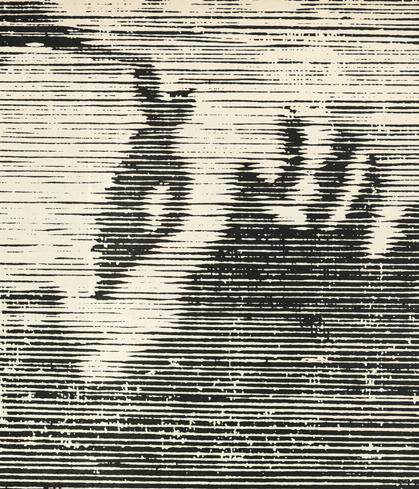 HUGO KA CANHAM
HUGO KA CANHAM
In Riotous Deathscapes, Hugo ka Canham presents an understanding of life and death based on indigenous and black ways of knowing that he terms Mpondo theory. Focusing on amaMpondo people from rural Mpondoland, in South Africa’s Eastern Cape, Canham outlines the methodologies that have enabled the community’s resilience and survival. He assembles historical events and a cast of ancestral and living characters, following the tenor of village life to offer a portrait of how Mpondo people live and die in the face of centuries of abandonment, trauma, antiblackness, and death. Canham shows that Mpondo theory is grounded in and develops in relation to the natural world, where the river and hill are key sites of being and resistance. Central, too, is the interface between ancestors and the living, in which life and death become a continuity and a boundlessness that white supremacy and neoliberalism cannot interdict. By charting a course of black life in Mpondoland, Canham tells a story of blackness on the African continent and beyond.
R I O T O U SDEATHSCAPES
March 280 pages, 18 illustrations paper, 978-1-4780-1959-6 $26.95/£22.99 cloth, 978-1-4780-1695-3 $99.95/£90.00

Art history and visual culture/Black studies

Death’s Futurity
The Visual Life of Black Power SAMPADA ARANKE
In Death’s Futurity Sampada Aranke examines the importance of representations of death to Black liberation. Aranke analyzes posters, photographs, journalism, and films that focus on the murders of Black Panther Party members Lil’ Bobby Hutton, Fred Hampton, and George Jackson to construct a visual history of the 1960s and 1970s Black Power era. She shows how Black radicals used these murders to engage in political action that imagined Black futurity from the position of death. Photographs of Hutton that appeared on flyers and posters called attention to the condition of his death while the 1971 documentary The Murder of Fred Hampton enabled the consideration of Hampton’s afterlife through visual meditations on his murder. Printmaking and political posters surrounding Jackson’s murder marked the transition from Black Power to the prison abolition movement in ways that highlighted the relationship between surveillance, policing, incarceration, and anti-Black violence. By foregrounding the photographed, collaged, filmed, and drawn Black body, Aranke demonstrates that corporeality and corpses are crucial to the efforts to shape visions of a Black future free from white supremacy.

THE VISUAL ARTS OF AFRICA AND ITS DIASPORAS A series edited by Kellie Jones and Steven Nelson Sampada Aranke is Assistant Professor of Art History, Theory, and Criticism at the School of the Art Institute of Chicago.
Death’s Futurity
February 232 pages, 41 color illustrations paper, 978-1-4780-1930-5 $25.95/£21.99 cloth, 978-1-4780-1666-3 $99.95/£90.00
21 African studies/Black studies
DUKE UNIVERSITY PRESS SCHOLARS OF COLOR FIRST BOOK AWARD
Hugo ka Canham is Associate Professor of Psychology at the University of the Witwatersrand and coeditor of Black Academic Voices: The South African Experience
HUGO KA CANHAM
The Visual Life of Black Power
Sampada Aranke
August 272 pages, 78 illustrations paper, 978-1-4780-1985-5 $26.95/£22.99 cloth, 978-1-4780-1715-8 $99.95/£90.00
Insignificant Things
Amulets and the Art of Survival in the Early Black Atlantic MATTHEW FRANCIS RAREY
In Insignificant Things Matthew Francis Rarey traces the history of the African-associated amulets that enslaved and other marginalized people carried as tools of survival in the Black Atlantic world from the seventeenth to the nineteenth centuries. Often considered visually benign by white Europeans, these amulet pouches, commonly known as “mandingas,” were used across Africa, Brazil, and Portugal and contained myriad objects, from herbs and Islamic prayers to shells and coins. Drawing on Arabic-language narratives from the West African Sahel, the archives of the Portuguese Inquisition, sixteenth- and seventeenth-century European travel and merchant accounts of the West African Coast, and early nineteenth-century Brazilian police records, Rarey shows how mandingas func tioned as portable archives of their makers’ experiences of enslavement, displacement, and diaspora. He presents them as examples of the visual culture of enslavement and critical to conceptualizing Black Atlantic art history. Ultimately, Rarey looks to the archives of trans atlantic slavery, which were meant to erase Black life, for objects like the mandingas that were created to protect it.
THE VISUAL ARTS OF AFRICA AND ITS DIASPORAS A series edited by Kellie Jones and Steven Nelson
Matthew Francis Rarey is Associate Professor of Art History at Oberlin College.
Visual culture/Africa and African diaspora

To Be Nsala’s Daughter
Decomposing
To Be
Nsala’s Daughter
Decomposing the Colonial Gaze
Chérie N. Rivers
March 128 pages, 79 illustrations, 6.125”x 9.25” paper, 978-1-4780-1909-1 $22.95/£19.99 cloth, 978-1-4780-1645-8 $84.95/£76.00
In To Be Nsala’s Daughter, Chérie N. Rivers shows how colonial systems of normalized vio lence condition the way we see and, through collaboration with contemporary Congolese artists, imagines ways we might learn to see differently. Rivers focuses on a photograph of a Congolese man, Nsala, looking at the disembodied hand and foot of his daughter, which were removed as punishment for his failure to deliver the requisite amount of rubber in King Léopold’s Congo. This photograph, taken by British missionary Alice Seeley Harris, featured prominently in abolitionist campaigns to end colonial atrocities in Central Africa in the early twentieth century. But in addition to exposing the visible violence of colonial ism, Rivers argues, this photograph also exposes the invisible—and continued—violence of the colonial gaze. With a poetic, personal collage of stories and images, To Be Nsala’s Daughter traces the past and present of the colonial gaze both in Congo and in the author’s lived experience as a mixed-race Black woman in the United States.
Chérie N. Rivers is Associate Professor of Geography at the University of North Carolina, Chapel Hill, author of Necessary Noise: Music, Film, and Charitable Imperialism in the East of Congo, and coeditor of The Art of Emergency: Aesthetics and Aid in African Crises.
Art history/Black
diaspora
the Colonial Gaze CHÉRIE N. RIVERS
22
Don’t Look Away
Art, Nonviolence, and Preventive Publics in Contemporary Europe
BRIANNE COHEN
In Don’t Look Away Brianne Cohen considers the role of contemporary art in developing a public commitment to ending structural violence in Europe. Cohen focuses on art activ ism after the turn of the twenty-first century that confronts the slow violence perpetuated against precarious peoples. Exploring the work of German filmmaker Harun Farocki, Swiss artist Thomas Hirschhorn, and the art collective Henry VIII’s Wives, Cohen argues that their recursive art practices offer a more sustained counter to the violence undergirding the public sphere than do artworks premised on immediate rupture. Their art reflects on a variety of flashpoints of violence and vulnerability in Europe, from the legacy of the Holocaust to Islamophobia and rising anti-immigrant sentiment. Because this violence has often cultivated fear-based publics, Cohen contends that art must foster ethical and civic relations between strangers across physical and virtual borders. In contrast to art-critical practices that privilege direct action in contemporary art activism, Cohen advocates for the imaginative, messier, often more elusive potential of art in changing mindsets and fostering a nonviolent social imaginary.
don’t look away
May 216 pages, 45 illustrations, including 22 in color paper, 978-1-4780-1946-6 $24.95/£21.99 cloth, 978-1-4780-1681-6 $94.95/£85.00
Media studies/Film and video
The Media Swirl
Politics, Audiovisuality, and Aesthetics
CAROL VERNALLIS

From fan-generated content on TikTok to music videos, the contemporary media landscape is becoming ever more vast, spectacular, and intense. In The Media Swirl Carol Vernallis examines short-form audiovisual media—Beyoncé’s Lemonade, brief sequences from Baz Luhrmann’s Great Gatsby, TikTok challenges, YouTube mashups, commercials, and many other examples—to offer ways of understanding digital media. She analyzes music videos by Beyoncé, Lady Gaga, Janelle Monáe, Kendrick Lamar, Anderson .Paak, and others to outline how sound and image enhance each other and shape a viewer’s mood. Responding to today’s political-media landscape through discussions of Fox News and presidential inaugurations, Vernallis shows how a media literacy that exceeds newscasts and campaign advertising is central to engaging with the democratic commons. Forays into industry studies, neuroscience, and ethics also inform her readings. By creating our own media and knowing what corporations, the wealthy, and the government do through media, Vernallis contends that we can create a more just world.
Carol Vernallis is an Affiliated Researcher at Stanford University, author of Unruly Media: YouTube, Music Video, and the New Digital Cinema and Experiencing Music Video: Aesthetics and Cultural Context, and coeditor of, most recently, Cybermedia: Explorations in Science, Sound, and Vision
April 464 pages, 114 illustrations paper, 978-1-4780-1906-0 $31.95/£27.99 cloth, 978-1-4780-1642-7 $114.95/£103.00
Art history
Brianne Cohen is Assistant Professor of Art and Art History at the University of Colorado Boulder and coeditor of The Photofilmic: Entangled Images in Contemporary Art and Visual Culture
Art, NoNvioleNce, ANd PreveNtive Publics iN coNtemPorAry euroPe briANNe coheN
23
uncomfor table television hunter hargraves
Uncomfortable
Television
HUNTER HARGRAVES
From The Wire to Intervention to Girls, postmillennial American television has dazzled audiences with novelistic seriality and cinematic aesthetics. Yet this television is also more perverse: it bombards audiences with misogynistic and racialized violence, graphic sex, substance abuse, unlikeable protagonists, and the extraordinary exploitation of ordinary people. In Uncomfortable Television, Hunter Hargraves examines how television makes its audiences find pleasure through feeling disturbed. He shows that this turn to discomfort realigns collective definitions of family and pleasure with the values of neoliberal culture. In viscerally violent dramas, cringeworthy ironic comedies, and trashy reality programs alike, televisual unease trains audiences to survive under late capitalism, which demands that individuals accept a certain amount of discomfort, dread, and irritation into their everyday lives. By highlighting how discomfort has been central to the reorganization and legitimization of television as an art form, Hargraves demonstrates television’s role in assimilating viewers into worlds marked by precarity, perversity, and crisis.
February 264 pages, 32 illustrations paper, 978-1-4780-1957-2 $26.95/£22.99 cloth, 978-1-4780-1693-9 $99.95/£90.00
Hunter Hargraves is Associate Professor of Cinema and Television Arts at California State University, Fullerton.
Media studies/Science and technology
The Virus Touch
Theorizing Epidemic Media BISHNUPRIYA GHOSH
June 304 pages, 56 illustrations, including 22 in color paper, 978-1-4780-1921-3 $27.95/£23.99 cloth, 978-1-4780-1657-1 $104.95/£94.00
In The Virus Touch Bishnupriya Ghosh argues that media are central to understanding emergent relations between viruses, humans, and nonhuman life. Writing in the shadow of the hiv/aids and covid-19 global pandemics, Ghosh theorizes “epidemic media” to show how epidemics are mediated in images, numbers, and movements through the processes of reading test results and tracking infection and mortality rates. Scientific, artistic, and activist epidemic media that make multispecies relations sensible and manageable eschew anthropocentric survival strategies and instead recast global public health crises as biologi cal, social, and ecological catastrophes, pushing us towards a multispecies politics of health. Ghosh trains her analytic gaze on these mediations as expressed in the collection and anal ysis of blood samples as a form of viral media; the geospatialization of data that track viral hosts like wild primates; and the use of multisensory images to trace fluctuations in viral mutations. Studying how epidemic media inscribe, store, and transmit multispecies rela tions attunes us to the anthropogenic drivers of pathogenicity like deforestation or illegal wildlife trading and the vulnerabilities of diseases that arise from socioeconomic inequities and biopolitical neglect.
EXPERIMENTAL FUTURES

Technological lives, scientific arts, anthropological voices
A series edited by Michael M. J. Fischer and Joseph Dumit
Bishnupriya Ghosh is Professor of English and Global Studies at the University of California, Santa Barbara, author of Global Icons: Apertures to the Popular, also published by Duke University Press, and coeditor of The Routledge Companion to Media and Risk.
24 TV/American
studies
Working Musicians
Labor and Creativity in Film and Television Production
TIMOTHY D. TAYLOR
In Working Musicians Timothy D. Taylor offers a behind-the-scenes look at the labor of the mostly unknown composers, music editors, orchestrators, recording engineers, and other workers involved in producing music for films, television, and video games. Drawing on dozens of interviews with music workers in Los Angeles, Taylor explores the nature of their work and how they understand their roles in the entertainment business. Taylor traces how these cultural laborers have adapted to and cope with the conditions of neoliberalism, as over the past decade, their working conditions have become increasingly precarious. Digital technologies have accelerated production timelines and changed how content is delivered, while new pay schemes have emerged that have transformed composers from artists into managers and paymasters. Taylor demonstrates that as bureaucratization and commercialization affect every aspect of media, the composers, musicians, music editors, engineers, and others whose soundtracks excite, inspire, and touch millions face the same structural economic challenges that have transformed American society, concentrating wealth and power in fewer and fewer hands.
Timothy D. Taylor is Professor of Anthropology, Ethnomusicology, and Musicology at the University of California, Los Angeles, and author of many books, including Beyond Exoticism: Western Music and the World, also published by Duke University Press, and Music and Capitalism: A History of the Present.
Native and Indigenous studies/Food studies/Hawai'i
Cooling the Tropics
Ice, Indigeneity, and Hawaiian Refreshment
HI`ILEI JULIA KAWEHIPUAAKAHAOPULANI
HOBART
Beginning in the mid-1800s, Americans hauled frozen pond water, then glacial ice, and then ice machines to Hawaiʻi—all in an effort to reshape the islands in the service of Western pleasure and profit. Marketed as “essential” for white occupants of the nineteenth-century Pacific, ice quickly permeated the foodscape through advancements in freezing and refrig eration technologies. In Cooling the Tropics Hiʻilei Julia Kawehipuaakahaopulani Hobart charts the social history of ice in Hawaiʻi to show how the interlinked concepts of freshness and refreshment mark colonial relationships to the tropics. From chilled drinks and sweets to machinery, she shows how ice and refrigeration underpinned settler colonial ideas about race, environment, and the senses. By outlining how ice shaped Hawaiʻi’s food system in accordance with racial and environmental imaginaries, Hobart demonstrates that thermal technologies can—and must—be attended to in struggles for food sovereignty and political self-determination in Hawaiʻi and beyond.

ELEMENTS
A series
Hiʻilei
April 256 pages, 1 illustration paper, 978-1-4780-1987-9 $25.95/£21.99 cloth, 978-1-4780-1717-2 $99.95/£90.00
December 264 pages, 10 illustrations paper, 978-1-4780-1919-0 $26.95/£21.99 cloth, 978-1-4780-1655-7 $99.95/£90.00
Music/Film & TV/Anthropology
DUKE UNIVERSITY PRESS SCHOLARS OF COLOR FIRST BOOK AWARD
edited by Stacy Alaimo and Nicole Starosielski
Julia Kawehipuaakahaopulani Hobart is Assistant Professor of Native and Indigenous Studies at Yale University and editor of The Foodways of Hawai'i: Past and Present
HI‘ILEI JULIA KAWEHIPUAAKAHAOPULANI HOBART
ICE, INDIGENEITY, AND HAWAIIAN REFRESHMENT
25
eating beside ourselves
thresholds of foods and bodies
Anthropology/Food studies/Science studies
Eating beside Ourselves
Thresholds of Foods and Bodies HEATHER PAXSON, editor
February 248 pages, 13 illustrations paper, 978-1-4780-1943-5 $25.95/£21.99 cloth, 978-1-4780-1678-6 $99.95/£90.00
Eating beside Ourselves examines eating as a site of transfer and transformation across bodies and selves. The contributors show that by turning organic substance into food, acts of eating create interconnected food webs organized by relative conditions of edibility through which eaters may in turn become eaten. In case studies ranging from nineteenthand twentieth-century industrial animal husbandry in the United States, biodynamic winemaking in Aotearoa / New Zealand, and reindeer herding in Arctic Norway to the creation of taste sensation in pet food and the entanglement of sugar and diabetes in the Caribbean, the contributors explore how food and eating create thresholds for human and nonhuman relations. These thresholds mediate different conditions and states of being: between living and dying, between the edible and the inedible, and the relationship between living organisms and their surrounding environment. In this way, acts of eating and the process of metabolism partake in the making and unmaking of multispecies ontol ogies, taxonomies, and ecologies.
Contributors Alex Blanchette, Deborah Heath, Hannah Landecker, Marianne Elisabeth Lien, Amy Moran-Thomas, Heather Paxson, Harris Solomon, Emily Yates-Doerr, Wim Van Daele
Heather Paxson is William R. Kenan, Jr. Professor of Anthropology at the Massachusetts Institute of Technology and author of The Life of Cheese: Crafting Food and Value in America and Making Modern Mothers: Ethics and Family Planning in Urban Greece.
Anthropology/Latin American studies/Science studies
The Spectacular Generic Pharmaceuticals and the Simipolitical in Mexico CORI HAYDEN
THE
SPECTACULAR GENERIC CORI HAYDEN Pharmaceuticals and the Simipolitical in Mexico

In The Spectacular Generic, Cori Hayden examines how generic drugs have transformed public health politics and everyday experiences of pharmaceutical consumption in Latin America. Focusing on the Mexican pharmacy chain Farmacias Similares and its proprietor, Víctor González Torres, Hayden shows how generics have become potent commodities in a postpatent world. In the early 2000s, González Torres, a.k.a. “Dr. Simi,” capitalized on the creation of new markets for generic medicines, selling cheaper copies of leading-brand drugs across Latin America. But Dr. Simi has not simply competed with the transnationals; his enterprise has also come to compete with the Mexican state, reorganizing the provi sion of medicine and basic health care for millions of people. Hayden juxtaposes this story with Dr. Simi’s less successful efforts in Argentina, where he confronted a radically differ ent configuration of pharmaceutical politics. Building from these diverging trajectories, Hayden illuminates the politics of generic substitution as a question that goes beyond sub stituting one drug for another. Generic politics can radically reshape the relations among consumers, states, and pharmaceutical markets, even as they have yet to resolve the prob lems of cost and access.
CRITICAL GLOBAL HEALTH: EVIDENCE, EFFICACY, ETHNOGRAPHY A series edited by Vincanne Adams and João Biehl
Cori Hayden is Professor of Anthropology at the University of California, Berkeley, and author of When Nature Goes Public: The Making and Unmaking of Bioprospecting in Mexico

26
Heather Paxson editor
264 pages, 10 illustrations
February
paper, 978-1-4780-1904-6 $25.95/£20.99 cloth, 978-1-4780-1640-3 $99.95/£90.00
Arc of Interference
Medical Anthropology for Worlds on Edge
JOÃO BIEHL and VINCANNE ADAMS, editors
With a foreword by PAUL FARMER
The radically humanistic essays of Arc of Interference refigure our sense of the real, the ethical, and the political in the face of mounting social and planetary upheavals. Cre atively assembled around Arthur Kleinman’s medical anthropological arc and eschewing hegemonic modes of intervention, they advance the notion of a care-ful ethnographic praxis of interference. To interfere is to dislodge ideals of naturalness, blast enduring bina ries (human-nonhuman, self-other, us-them), and redirect technocratic agendas while summoning relational knowledge and the will to create community. The book’s multiple ethnographic arcs of interference provide a vital conceptual toolkit for today’s world and a badly needed moral perch to peer toward just horizons.
Contributors Vincanne Adams, João Biehl, Davíd Carrasco, Lawrence Cohen, Jean Comaroff, Robert Desjarlais, Paul Farmer, Marcia Inhorn, Janis H. Jenkins, David S. Jones, Salmaan Keshavjee, Arthur Kleinman, Margaret Lock, Adriana Petryna
CRITICAL GLOBAL HEALTH: EVIDENCE, EFFICACY, ETHNOGRAPHY
A series edited by Vincanne Adams and João Biehl
João Biehl is Susan Dod Brown Professor and Chair of Anthropology at Princeton University and co editor of Unfinished: The Anthropology of Becoming, also published by Duke University Press. Vincanne Adams is Professor of Medical Anthropology at the University of California, San Francisco and author of Glyphosate and the Swirl: An Agroindustrial Chemical on the Move, also published by Duke University Press. Paul Farmer (1959–2022) was Kolokotrones University Professor and Chair of the Department of Global Health and Social Medicine at Harvard Medical School.
Science studies/Anthropology/Asian studies

Infertile Environments
Epigenetic Toxicology and the Reproductive Health of Chinese Men JANELLE LAMOREAUX
In Infertile Environments, Janelle Lamoreaux investigates how epigenetic research into the effects of toxic exposure conceptualizes and configures environments. Drawing on field work in a Nanjing, China, toxicology lab that studies the influence of pesticides and other pollutants on male reproductive and developmental health, Lamoreaux shows how the lab’s everyday research practices bring national, hormonal, dietary, maternal, and laboratory environments into being. She situates the lab’s work within broader Chinese history as well as the contemporary cultural and political moment, in which declining fertility rates and reproductive governance and technology are growing concerns. She also points to how toxicology in China is a transnational endeavor tied to both local conditions and interna tional research agendas and infrastructures, which highlights the myriad scales and scope of epigenetic environments. At a moment of growing concerns about toxins, endocrine-dis rupting chemicals, and climate change, Lamoreaux demonstrates that epigenetic research’s proliferation of environments produces new kinds of toxic relations that impact multiple generations of humans.
CRITICAL GLOBAL HEALTH: EVIDENCE, EFFICACY, ETHNOGRAPHY
A series edited by Vincanne Adams and João Biehl
Janelle Lamoreaux is Associate Professor of Anthropology at the University of Arizona and coeditor of the Routledge Handbook of Genomics, Health, and Society
Arc of
Interference
April 408 pages, 16 illustrations paper, 978-1-4780-1980-0 $29.95/£24.99 cloth, 978-1-4780-1709-7 $109.95/£95.00
Infertile Environments
Epigenetic Toxicology and the Reproductive Health of
January 160 pages, 3 illustrations paper, 978-1-4780-1933-6 $23.95/£20.99 cloth, 978-1-4780-1670-0 $89.95/£81.00
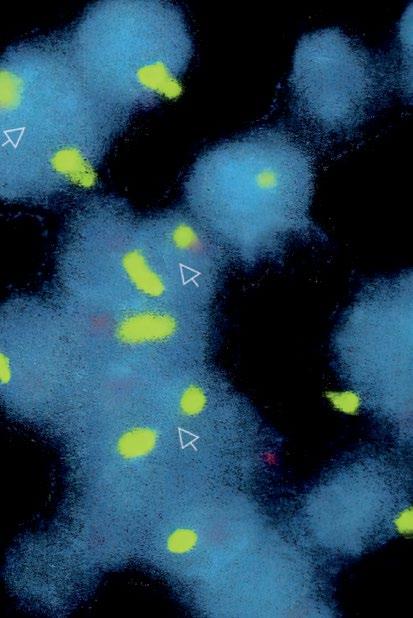
Medical anthropology/Global health
João Biehl & Vincanne Adams EDITORS with a foreword by Paul Farmer
Medical Anthropology for Worlds on Edge
Chinese Men Janelle Lamoreaux
27
River Life and the Upspring of Nature
River Life and the Upspring of Nature
NAVEEDA KHAN
In River Life and the Upspring of Nature Naveeda Khan examines the relationship between nature and culture through the study of the everyday existence of chauras, the people who live on the chars (sandbars) within the Jamuna River in Bangladesh. Nature is a pri mary force at play within this existence as chauras live itinerantly and in flux with the ever-changing river flows; where land is here today and gone tomorrow, the quality of life itself is intertwined with this mutability. Given this centrality of nature to chaura life, Khan contends that we must think of nature not simply as the physical landscape and the plants and animals that live within it but as that which exists within the social and at the level of cognition, the unconscious, intuition, memory, embodiment, and symbolization. By show ing how the alluvial flood plains configure chaura life, Khan shows how nature can both give rise to and inhabit social, political, and spiritual forms of life.
February 256 pages, 27 illustrations paper, 978-1-4780-1939-8 $26.95/£22.99 cloth, 978-1-4780-1673-1 $99.95/£90.00
Naveeda Khan is Associate Professor of Anthropology at Johns Hopkins University, author of Muslim Becoming: Aspiration and Skepticism in Pakistan, also published by Duke University Press, and In Quest of a Shared Planet: Negotiating Climate from the Global South, and editor of Beyond Crisis: Reevaluating Pakistan
Anthropology/South Asian studies
Composing Violence
The Limits of Exposure and the Making of Minorities MOYUKH CHATTERJEE
The Limits of Exposure and the Making of Minorities MOYUKH CHATTERJEE
COMPOSING VIOLENCE
February 184 pages, 6 illustrations paper, 978-1-4780-1966-4 $25.95/£21.99 cloth, 978-1-4780-1702-8 $99.95/£90.00
In 2002, armed Hindu mobs attacked Muslims in broad daylight in the west Indian state of Gujarat. The pogrom, which was widely seen over television, left more than one thousand dead. In Composing Violence Moyukh Chatterjee examines how highly visible political violence against minorities acts as a catalyst for radical changes in law, public culture, and power. He shows that, far from being quashed through its exposure by activists, media, and politicians, state-sanctioned anti-Muslim violence set the stage for transforming India into a Hindu supremacist state. The state and civil society’s responses to the violence, Chat terjee contends, reveal the constitutive features of modern democracy in which riots and pogroms are techniques to produce a form of society based on a killable minority and a tri umphant majority. Focusing on courtroom procedures, police archives, legal activism, and mainstream media coverage, Chatterjee theorizes violence as a form of governance that creates minority populations. By tracing the composition of anti-Muslim violence and the legal structures that transform that violence into the making of minorities and majorities, Chatterjee demonstrates that violence is intrinsic to liberal democracy.
THEORY IN FORMS
A series edited by Nancy Rose Hunt, Achille Mbembe, and Todd Meyers

Moyukh Chatterjee is a Visiting Scholar at the University of Edinburgh.

28
Anthropology/South Asian studies/Environmental studies
Naveeda Kha N
Hailing the State
Indian Democracy between Elections
LISA MITCHELL
In Hailing the State, Lisa Mitchell explores the methods of collective assembly that people in India use to hold elected officials and government administrators accountable, demand inclusion in decision making, and stage informal referendums. Mitchell traces the colonial and postcolonial lineages of collective forms of assembly, in which participants—rather than rejecting state authority—mobilize with expectations that officials will uphold the law and fulfill electoral promises. She shows how assembly, which ranges from sit-ins, hunger strikes, and demands for meetings with officials to massive general strikes and road and rail blockades, is fundamental to the functioning of democracy in India. These techniques are particularly useful for historically marginalized groups and others whose voices may not be easily heard. Moving beyond an exclusive focus on electoral processes, Mitchell argues that to understand democracy—both in India and beyond—we must also pay attention to what occurs between elections, thereby revising our understanding of what is possible for democratic action around the world.

Lisa Mitchell is Professor of History and Anthropology in the Department of South Asia Studies at the University of Pennsylvania and author of Language, Emotion, and Politics in South India: The Making of a Mother Tongue.
HAILING THE STATE
April 320 pages, 21 illustrations paper, 978-1-4780-1876-6 $27.95/£22.99 cloth, 978-1-4780-1612-0 $104.95/£90.00
Probing
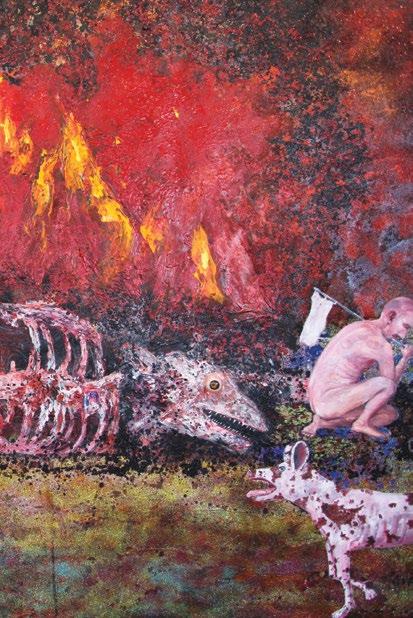
Probing Arts and Emergent Forms of Life
MICHAEL M. J. FISCHER
In Probing Arts and Emergent Forms of Life Michael M. J. Fischer calls for a new anthro pology of the arts that attends to the materialities and technologies of the world as it exists today. Fischer examines the work of key Southeast and East Asian artists within the cruci bles of unequal access, geopolitics, the reverberations of past traumas, and emergent new socialities. He outlines how artist-theorists including Entang Wiharso, Sally Smart, Charles Lim, Zai Kuning, and Kiran Kumar speculate on how the world is changing in ways that are attuned to cultivating, repairing, and rethinking the world in the Anthropocene. Their artis tic vocabulary not only undoes Western art models and categories; it probes the unfolding future, addresses past trauma, and creates contested, vibrant, and flourishing spaces. Throughout Indonesia, Korea, Singapore, Thailand, and Vietnam, and from Kumar’s experi mental dance to Kuning’s rattan and beeswax ghost ships to Lim’s videography of Singapore from the sea, Fischer argues that these artists’ theoretical discourses should be privileged over those of the curators, historians, critics, and other gatekeepers who protect and claim art worlds for themselves.
EXPERIMENTAL FUTURES
Technological lives, scientific arts, anthropological voices
A series edited by Michael M. J. Fischer and Joseph Dumit
Michael M. J. Fischer is Andrew W. Mellon Professor in the Humanities and Professor of Anthropol ogy and Science and Technology Studies at Massachusetts Institute of Technology. He is the author of numerous books, including At the Pivot of East and West: Ethnographic, Literary, and Filmic Arts and Anthropology in the Meantime: Experimental Ethnography, Theory, and Method for the Twenty-First Century, both also published by Duke University Press.
Arts and Emergent Forms of Life
May 336 pages, 66 illustrations, including 37 in color paper, 978-1-4780-1977-0 $25.95/£21.99 cloth, 978-1-4780-1705-9 $99.95/£90.00
29 Political theory/Anthropology/South Asian history
Anthropology/Contemporary art/Southeast Asian studies
INDIAN DEMOCRACY BETWEEN ELECTIONS
LISA MITCHELL
Michael M. J. Fischer
Sovereignty Unhinged
March 368 pages, 32 color illustrations paper, 978-1-4780-1908-4 $28.95/£24.99 cloth, 978-1-4780-1644-1 $104.95/£94.00
Sovereignty Unhinged
An Illustrated Primer for the Study of Present Intensities, Disavowals, and Temporal Derangements DEBORAH A.
THOMAS and JOSEPH MASCO, editors
Sovereignty Unhinged theorizes sovereignty beyond the typical understandings of action, control, and the nation-state. Rather than engaging with the geopolitical realities of the present, the contributors consider sovereignty from the perspective of how it is lived and enacted in everyday practice and how it reflects people’s aspirations for new futures. In a series of ethnographic case studies ranging from the Americas to the Middle East to South Asia, they examine the means of avoiding the political and historical capture that make one complicit with sovereign authority rather than creating the conditions of possibility to confront it. The contributors attend to the affective dimensions of these practices of world-building to illuminate the epistemological, ontological, and transnational entangle ments that produce a sense of what is possible. They also trace how sovereignty is activated and deactivated over the course of a lifetime within the struggle of the everyday. In so doing, they outline how individuals create and enact forms of sovereignty that allow them to endure fast and slow forms of violence while embracing endless opportunities for build ing new worlds.
Contributors Alex Blanchette, Yarimar Bonilla, Jessica Cattelino, María Elena García, Akhil Gupta, Lochlann Jain, Purnima Mankekar, Joseph Masco, Michael Ralph, Danilyn Rutherford, Arjun Shankar, Kristen L. Simmons, Deborah A. Thomas, Leniqueca A. Welcome, Kaya Naomi Williams, Jessica Winegar
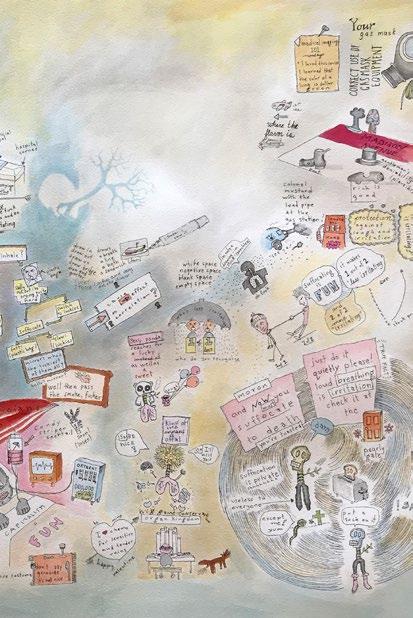
Deborah A. Thomas is R. Jean Brownlee Professor of Anthropology at the University of Pennsylvania and author of Political Life in the Wake of the Plantation: Sovereignty, Witnessing, Repair, also published by Duke University Press. Joseph Masco is Professor of Anthropology at the University of Chicago and author of The Future of Fallout, and Other Episodes in Radioactive WorldMaking, also published by Duke University Press.
Anthropology/Latin American studies/Environmental studies
WHEN FORESTS RUN AMOK
When Forests Run Amok War and Its Afterlives in Indigenous and

Afro-Colombian Territories DANIEL RUIZ-SERNA
March 288 pages, 52 illustrations paper, 978-1-4780-1950-3 $26.95/£22.99 cloth, 978-1-4780-1687-8 $99.95/£90.00
In When Forests Run Amok Daniel Ruiz-Serna follows the afterlives of war, showing how they affect the variety of human and nonhuman beings that compose the region of Bajo Atrato: the traditional land of Indigenous and Afro-Colombian peoples. Attending to Colombia’s armed conflict as an experience that resounds in the lives and deaths of people, animals, trees, rivers, and spirits, Ruiz-Serna traces a lasting damage that brought Indig enous peoples to compel the Colombian government to legally recognize their territories as victims of war. Although this recognition extends transitional justice into new terrains, Ruiz-Serna considers the collective and individual wounds that continue unsettling spirits, preventing shamans from containing evil, attracting jaguars to the taste of human flesh, troubling the flow of rivers, and impeding the ability of people to properly deal with the dead. Ruiz-Serna raises potent questions about the meanings of justice, the forms it can take, and the limits of human-rights frameworks to repair the cosmic order that war unrav els when it unsettles more-than-human worlds—causing forests to run amok.
Anthropology/Social theory/Affect theory
an ILLUSTRATED PRIMER for the STUDY of PRESENT INTENSITIES, DISAVOWALS, and TEMPORAL DERANGEMENTS DEBORAH A. THOMAS and JOSEPH MASCO, editors
Daniel Ruiz-Serna is Lecturer of Anthropology at Dawson College.
War and Its Afterlives in Indigenous and Afro-Colombian Territories
Daniel Ruiz-Serna
30
Unknowing and the Everyday Sufism and Knowledge in Iran
SEEMA GOLESTANEH
In Unknowing and the Everyday Seema Golestaneh examines how Sufi mystical experience in Iran shapes contemporary life. Central to this process is ma’rifat, or “unknowing”—the idea that, as it is ultimately impossible to fully understand the divine, humanity must operate from an engaged awareness that we know nothing. Golestaneh shows that rather than considering ma’rifat an obstacle to intellectual engagement, Sufis embrace that there will always be that which they do not know. From this position, they affirm both the limits of human knowledge and the mysteries of the profane world. Through ethnographic case studies, Golestaneh traces the affective and sensory dimensions of ma’rifat in contexts such as the creation of collective Sufi spaces, the interpretation of Persian poetry, formulations of selfhood and non-selfhood, and the navigation of the socio-material realm. By outlining the relationship between ma’rifat and religious, aesthetic, and social life in Iran, Golestaneh demonstrates that for Sufis, the outer bounds of human thought are the beginning rather than the limit.

E vEryday and the
February 256 pages, 4 illustrations paper, 978-1-4780-1953-4 $25.95/£21.99 cloth, 978-1-4780-1689-2 $99.95/£90.00
Waste Works
Vital Politics in Urban Ghana BRENDA CHALFIN

In Waste Works, Brenda Chalfin examines Ghana’s planned city of Tema, theorizing about the formative role of waste infrastructure in urban politics and public life. Chalfin argues that at Tema’s midcentury founding, a prime objective of governing authorities was to cultivate self-contained citizens by means of tightly orchestrated domestic infrastructure and centralized control of bodily excrement to both develop and depoliticize the new nation. Comparing infrastructural innovations across the city, Chalfin excavates how Tema residents pursue novel approaches to urban waste and sanitation built on the ruins of the inherited order, profoundly altering the urban public sphere. Once decreed a private matter to be guaranteed by state authorities, excrement becomes a public issue, collectively managed by private persons. Pushing self-care into public space and extending domestic responsibility for public well-being and bodily outputs, popularly devised waste infrastruc tures are a decisive arena to make claims, build coalitions, and cultivate status. Confounding high-modernist ideals, excremental infrastructures unlock bodily waste’s diverse political potentials.
Brenda Chalfin is Professor of Anthropology at the University of Florida and author of Neoliberal Frontiers: An Ethnography of Sovereignty in West Africa and Shea Butter Republic: State Power, Global Markets, and the Making of an Indigenous Commodity
Waste Works
June 384 pages, 105 illustrations, including 37 in color paper, 978-1-4780-1958-9 $29.95/£24.99 cloth, 978-1-4780-1694-6 $109.95/£95.00
Anthropology/Middle East studies/Religion
Seema Golestaneh is Assistant Professor of Near Eastern Studies at Cornell University.
African studies/Anthropology
Unknowing
S eema Goles taneh
Sufi S m and Knowledge in i
ran
Brenda Chalfin
Vital Politics in Urban Ghana
31
April 232 pages, 10 illustrations paper, 978-1-4780-1983-1 $25.95/£21.99 cloth 978-1-4780-1713-4 $99.95/£90.00
A Vital Frontier
Water Insurgencies in Europe ANDREA MUEHLEBACH
In A Vital Frontier Andrea Muehlebach examines the work of activists across Europe as they organize to preserve water as a commons and public good in the face of privatization. Traversing social, political, legal, and hydrological terrains, Muehlebach situates water as a political fault line at the frontiers of financialization, showing how the seemingly relentless expansion of capital into public utilities is being challenged by an equally relentless and often successful insurgence of political organizing. Drawing on ethnographic research, Muehlebach presents water protests as a vital politics that comprises popular referenda, barricades in the streets, huge demonstrations, the burning of utility bills, and legal dis putes over transparency and contracts. As Muehlebach documents, Europe’s water activists articulate their own values of democracy and just price, raising far-reaching political ques tions about private versus common property and financing, liberal democracy, sovereignty, legality, and collective infrastructural responsibility in the face of financialization and com modification. Muehlebach shows that water-rights activists can successfully resist financial markets by exposing the commodification of water as the theft of life itself.
Andrea Muehlebach is a Professor of Maritime Anthropology and Cultures of Water at the University of Bremen and author of The Moral Neoliberal: Welfare and Citizenship in Italy
Anthropology
Multispecies Justice
DANIELLE CELERMAJER and SOPHIE CHAO,
A special issue of Cultural Politics
issue editors
Utilizing a multispecies lens and anticolonial framework, contributors to this special issue seek to reconceptualize justice to include beings beyond the human realm. The authors imagine how existing political institutions—which determine the meaning and distri butions of value and power—might be formed and transformed in ways that respond to and afford justice in the lives, relations, and socialities of other-than-human beings. This institutional shift, the authors argue, would disrupt uneven fields of identity-based power, inequality, marginalization, and privilege. It would also foster practices of living together in ways that are hospitable to a broader range of subjects, both human and nonhuman, at a time of socio-ecological unraveling, threat, and instability. Essays cover a variety of topics, including the subterranean estrangement of stygofauna, slaughterhouses and factory farms, anticolonial conceptions of justice, critical plant studies, ecofeminism, and Indigenous cos mopolitics. The authors of this collection engage with methods and concepts derived from fields including cultural theory, anthropology, political theory, philosophy, art, history of science, queer/feminist theory, law, and conservation science.
Contributors Ravi Agarwal, Margaret Barbour, Danielle Celermajer, Sophie Chao, Sria Chatterjee, Janet Lawrence, Dalia Nasser, Astrida Neimanis, Susan Reid, Daniel Ruiz-Serna, Hayley Singer, Christine Winter
Danielle Celermajer is Professor of Sociology and Criminology, Deputy Director of the Sydney Environment Institute, and Lead of the Multi Species Justice Project at the University of Sydney, as well as the author of Summertime: Reflections on a Vanishing Future. Sophie Chao is Discovery Early Career Researcher Award Fellow and Lecturer in Anthropology at the University of Sydney and author of In the Shadow of the Palms: More-Than-Human Becomings in West Papua, also published by Duke University Press.

32
Anthropology
March 175 pages, 14 illustrations Volume 19, number 1 paper, 978-1-4780-2465-1 $18.00/£15.99
Janet Laurence, Birdsong (2006); Installation view Object Gallery, Sydney; assembly of taxidermy bird specimens, suspended acrylic ring, photograph by Keith Saunders.
Hard Luck and Heavy Rain
The Ecology of Stories in Southeast Texas JOSEPH
 C. RUSSO
C. RUSSO
In Hard Luck and Heavy Rain Joseph C. Russo takes readers into the everyday lives of the rural residents of Southeast Texas. He encounters the region as a kind of world enveloped in on itself, existing under a pall of poverty, illness, and oil refinery smoke. His informants’ stories cover a wide swath of experiences, from histories of lgbtq+ life and the local pet rochemical industries to religiosity among health food store employees and the suffering of cancer patients living in the Refinery Belt. Russo frames their hard-luck stories as forms of verbal art and poetic narrative that render the region a mythopoetic landscape that epitomizes the impasse of American late capitalism. He shows that in this severe world, questions of politics and history are not cut and dry, and its denizens are not simply back ward victims of circumstances. Russo demonstrates that by challenging classist stereotypes of rural Americans as passive, ignorant, and uneducated, his interlocutors offer significant insight sinto the contemporary United States.
Joseph C. Russo is Visiting Assistant Professor of Anthropology at Wesleyan University.
Hard Luck & Heavy R ain
January 152 pages, 6 illustrations paper, 978-1-4780-1905-3 $23.95/£20.99 cloth, 978-1-4780-1641-0 $89.95/£81.00
Going Underground
Race, Space, and the Subterranean in the Nineteenth-Century United States LARA LANGER COHEN

First popularized by newspaper coverage of the Underground Railroad in the 1840s, the underground serves as a metaphor for subversive activity that remains central to our politi cal vocabulary. In Going Underground, Lara Langer Cohen excavates the long history of this now familiar idea while seeking out versions of the underground that were left behind along the way. Outlining how the underground’s figurative sense first took shape through the associations of literal subterranean spaces with racialized Blackness, she examines a vibrant world of nineteenth-century US subterranean literature that includes Black radical manifes tos, anarchist periodicals, sensationalist exposés of the urban underworld, manuals for sex magic, and the initiation rites of secret societies. Cohen finds that the undergrounds in this literature offer sites of political possibility that exceed the familiar framework of resistance, suggesting that nineteenth-century undergrounds can inspire new modes of world-making and world-breaking for a time when this world feels increasingly untenable.
G oing Underground
Race,
January 288 pages, 8 illustrations paper, 978-1-4780-1948-0 $26.95/£22.99 cloth, 978-1-4780-1684-7 $99.95/£90.00
33 Anthropology/American
studies/Queer studies
American studies/African American studies
Joseph C. Russo
Lara Langer Cohen is Associate Professor of English at Swarthmore College, author of The Fabrication of American Literature: Fraudulence and Antebellum Print Culture, and coeditor of Early African American Print Culture
The Ecology of Stories
in Southeast Texas
Lara Langer Cohen
Space, and the SubteRR anean in the nineteenth centuRy united StateS
April 200 pages, 10 illustrations paper, 978-1-4780-1963-3 $24.95/£21.99 cloth, 978-1-4780-1699-1 $94.95/£85.00
Disappearing Rooms
The Hidden Theaters of Immigration Law MICHELLE CASTAÑEDA
In Disappearing Rooms Michelle Castañeda lays bare the criminalization of race enacted every day in US immigration courts and detention centers. She uses a performance studies perspective to show how the theatrical concept of mise-en-scène offers new insights about immigration law and the absurdist dynamics of carceral space. Castañeda draws upon her experiences in immigration trials as an interpreter and courtroom companion to analyze the scenography—lighting, staging, framing, gesture, speech, and choreography—of spe cific rooms within the immigration enforcement system. Castañeda’s ethnographies of proceedings in a “removal” office in New York City, a detention center courtroom in Texas, and an asylum office in the Northeast reveal the depersonalizing violence enacted in immi gration law through its embodied, ritualistic, and affective components. She shows how the creative practices of detained and disappeared peoples living under acute duress imagine the abolition of detention and borders. Featuring original illustrations by artist-journalist Molly Crabapple, Disappearing Rooms shines a light into otherwise hidden spaces of law within the contemporary deportation regime.
DUKE UNIVERSITY PRESS SCHOLARS OF COLOR FIRST BOOK AWARD
Michelle Castañeda is Assistant Professor of Performance Studies at New York University.
American studies/Religion
Capitalist Humanitarianism LUCIA HULSETHER
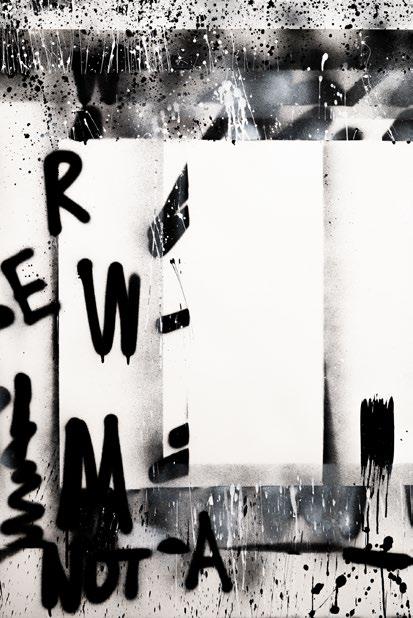
March 272 pages, 9 illustrations paper, 978-1-4780-1920-6 $26.95/£22.99 cloth, 978-1-4780-1656-4 $99.95/£90.00
The struggle against neoliberal order has gained momentum over the last five decades, to the point that economic elites have not only adapted to the Left’s critiques, but incorpo rated them for capitalist expansion. Venture funds expose their ties to slavery and pledge to invest in racial equity. Banks pitch microloans as a path to indigenous self-determination. Fair-trade brands narrate consumption as an act of feminist solidarity with women artisans in the global South. In Capitalist Humanitarianism Lucia Hulsether examines these proj ects and the contexts of their emergence. Blending historical and ethnographic styles, and traversing intimate and global scales, Hulsether tracks how neoliberal self-critique creates new institutional hegemonies that, in turn, reproduce racial and neocolonial dispossession. From the archives of Christian fair traders to luxury social entrepreneurship conferences, from US finance offices to Guatemalan towns flooded with their loan products, from ser vice economy desperation to the internal contradictions of social movements, Hulsether argues that capitalist humanitarian projects are fueled as much by a profit motive as by a hope that racial capitalism can redeem the losses that accumulate in its wake.
Lucia Hulsether is Assistant Professor of Religious Studies at Skidmore College.
34
Performance studies/Latinx studies
lucia hulsether capitalist humanitarianism
Invited to Witness
Solidarity Tourism across Occupied Palestine JENNIFER
 LYNN KELLY
LYNN KELLY
In Invited to Witness, Jennifer Lynn Kelly explores the significance of contemporary solidarity tourism across Occupied Palestine. Examining the relationships among race, colonialism, and movement-building in spaces where tourism and military occupation operate in tandem, Kelly argues that solidarity tourism in Palestine functions as both political strategy and emergent industry. She draws from fieldwork on solidarity tours in Palestine/Israel and interviews with guides, organizers, community members, and tourists, asking what happens when tourism is marketed as activism and when anticolonial work functions through tourism. Palestinian organizers, she demonstrates, have refashioned the conventions of tourism by extending invitations to tourists to witness Palestinian resistance and the effects of Israeli state practice on Palestinian land and lives. In so doing, Kelly shows how Palestinian guides and organizers wrest from Israeli control the capacity to invite and the permission to narrate both their oppression and their liberation.
January 344 pages, 45 illustrations paper, 978-1-4780-1929-9 $28.95/£23.99 cloth, 978-1-4780-1665-6 $104.95/£94.00
Between Banat

Queer Arab Critique and Transnational Arab Archives MEJDULENE BERNARD SHOMALI
In Between Banat Mejdulene Bernard Shomali examines homoeroticism and nonnor mative sexualities between Arab women in transnational Arab literature, art, and film. Moving from The Thousand and One Nights and the Golden Era of Egyptian cinema to contemporary novels, autobiographical writing, and prints and graphic novels that imagine queer Arab futures, Shomali uses what she calls queer Arab critique to locate queer desire amid heteronormative imperatives. Showing how systems of heteropatriarchy and Arab nationalisms foreclose queer Arab women’s futures, she draws on the transliterated term “banat”—the Arabic word for girls—to refer to women, femmes, and nonbinary people who disrupt stereotypical and Orientalist representations of the “Arab woman.” By attending to Arab women’s narration of desire and identity, queer Arab critique substantiates queer Arab histories while challenging Orientalist and Arab national paradigms that erase queer sub jects. In this way, Shomali frames queerness and Arabness as relational and transnational subject formations and contends that prioritizing transnational collectivity over politics of authenticity, respectability, and inclusion can help lead toward queer freedom.

Mejdulene Bernard Shomali is Assistant Professor of Gender, Women’s, and Sexuality Studies at the University of Maryland, Baltimore County.
February 224 pages, 9 illustrations paper, 978-1-4780-1927-5 $25.95/£21.99 cloth, 978-1-4780-1664-9 $99.95/£90.00
35
Critical ethnic studies/Middle East studies/Feminist studies
Jennifer Lynn Kelly is Associate Professor of Feminist Studies and of Critical Race and Ethnic Studies at the University of California, Santa Cruz.
Middle East studies/LGBTQ studies/Women’s studies
TO
TOURISM ACROSS
Jennifer Lynn Ke LLy Queer Arab Critique & Transnational Arab Archives Mejdulene Bernard Shomali
INVITED
WITNESS SOLIDARITY
OCCUPIED PALESTINE
GENDERED FORTUNES
Gendered Fortunes
Divination, Precarity, and Affect in Postsecular Turkey ZEYNEP K. KORKMAN
In Gendered Fortunes, Zeynep K. Korkman examines Turkey’s commercial fortunetelling cafés where secular Muslim women and lgbtqi individuals navigate the precarities of twenty-first-century life. Criminalized by long-standing secularist laws and disdained by contemporary Islamist government, fortunetelling cafés proliferate in part because they offer shelter from the conservative secularist, Islamist, neoliberal, and gender pressures of the public sphere. Korkman shows how fortunetelling is a form of affective labor through which its participants build intimate feminized publics in which they share and address their hopes and fears. Korkman uses feeling—which is how her interlocutors describe the divination process—as an analytic to view the shifting landscape of gendered vulnerability in Turkey. In so doing, Korkman foregrounds “feeling” as a feminist lens to explore how those who are pushed to the margins feel their way through oppressive landscapes to create new futures.
April 288 pages, 15 illustrations paper, 978-1-4780-1954-1 $26.95/£22.99 cloth, 978-1-4780-1690-8 $99.95/£90.00
Zeynep K. Korkman is Assistant Professor of Gender Studies at the University of California, Los Angeles.
South Asia/Gender studies
Semiotics of Rape
Sexual Subjectivity and Violation in Rural India

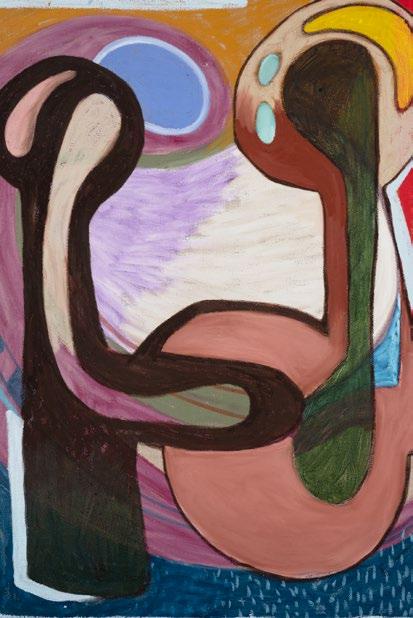
RUPAL OZA
In Semiotics of Rape, Rupal Oza follows the social life of rape in rural northwest India to reveal how rape is not only a violation of the body but a language through which a range of issues—including caste and gender hierarchies, control over land and labor, and the shape of justice—are contested. Rather than focus on the laws governing rape, Oza closely exam ines rape charges to show how the victims and survivors of rape reclaim their autonomy by refusing to see themselves as defined entirely by the act of violation. Oza also shows how rape cases become arenas where bureaucrats, village council members, caste communities, and the police debate women’s sexual subjectivities and how those varied understandings impact the status and reputations of individuals and groups. In this way, rape gains mean ing beyond the level of the survivor and victim to create a social category. By tracing the shifting meanings of sexual violence and justice, Oza offers insights into the social signifi cance of rape in India and beyond.
February 240 pages paper, 978-1-4780-1934-3 $25.95/£21.99 cloth, 978-1-4780-1671-7 $99.95/£90.00
Rupal Oza is Professor of Women and Gender Studies at Hunter College, City University of New York, and author of The Making of Neoliberal India: Nationalism, Gender, and the Paradoxes of Globalization
36 Gender studies/Middle East
studies
Precarity, and Affect in Postsecular
Divination,
Turkey
Zeynep K. Korkman
Semiotics of Rape Sexual Subjectivity and Violation in Rural India
Rupal Oza
Kids on the Street
Queer Kinship and Religion in San Francisco’s Tenderloin JOSEPH PLASTER

In Kids on the Street Joseph Plaster explores the informal support networks that enabled abandoned and runaway queer youth to survive in tenderloin districts across the United States. Tracing the history of the downtown lodging house districts where marginally housed youth regularly lived beginning in the late 1800s, Plaster focuses on San Francisco’s Tenderloin from the 1950s to the present. He draws on archival, ethnographic, oral history, and public humanities research to outline the queer kinship networks, religious practices, performative storytelling, and migratory patterns that allowed these kids to foster social support and mutual aid. He shows how they collectively and creatively managed the social trauma they experienced, in part by building relationships with johns, bartenders, hotel managers, bouncers, and other vice district denizens. By highlighting a politics where the marginal position of street kids is the basis for a moral economy of reciprocity, Plaster excavates a history of queer life that has been overshadowed by major narratives of gay progress and pride.
kids on the street
January 368 pages, 53 illustrations paper, 978-1-4780-1895-7 $28.95/£24.99 cloth, 978-1-4780-1631-1 $104.95/£94.00
Queer theory/German history
The Queer Art of History
Queer Kinship after Fascism JENNIFER V. EVANS
In The Queer Art of History Jennifer V. Evans examines postwar and contemporary German history to broadly argue for a practice of queer history that moves beyond bounded con cepts and narratives of identity. Drawing on black feminism, queer of color critique, and trans studies, Evans points out that although many rights for lgbtqi people have been gained in Germany, those rights have not been enjoyed equally. There remain fundamental struggles around whose bodies, behaviors, and communities belong. Evans uses kinship as an analytic category to identify the fraught and productive ways that Germans have con fronted race, gender nonconformity, and sexuality in social movements, art, and everyday life. Evans shows how kinship illuminates the work of solidarity and intersectional orga nizing across difference and offers an openness to forms of contemporary and historical queerness that may escape the archive’s confines. Through forms of kinship, queer and trans people test out new possibilities for citizenship, love, public, and family life in postwar Germany in ways that question claims about liberal democracy, the social contract, and the place of identity in rights-based discourses.
Jennifer V. Evans is Professor of History at Carleton University and author of Life among the Ruins: Cityscape and Sexuality in Cold War Berlin
April 328 pages, 50 illustrations, including 13 in color paper, 978-1-4780-1979-4 $27.95/£23.99 cloth, 978-1-4780-1711-0 $104.95/£94.00
37 LGBTQ history/Performance studies
Joseph Plaster is Curator in Public Humanities and Director of the Winston Tabb Special Collections Research Center at Johns Hopkins University.
Queer Kinship and Religion in San Francisco’s Tenderloin
JOSEPH PLASTER
February 112 pages
Volume 98, number 1 paper, 978-1-4780-2469-9 $12.00/£9.99
Queer and Trans Dialectology
Exploring the Intersectionality of Regionality
BRYCE MCCLEARY and TYLER KIBBEY, issue editors
A special issue of American Speech
In this special issue, the authors examine how place, region, and community shape contemporary dialectology. Contributors draw on the complex intersections of gender, sexuality, and other categories of identity to more fully examine the concept of regional ity, the linguistic differences associated with particular geographic locations. The authors demonstrate how queer and trans people linguistically negotiate and attend to different locations and contexts using examples such as the intersectional identity construction of Oklahoma City Drag Queens; the influence of English in new designations of nonbinary gender identities and sexual orientations in Quebec French; and queer language differenti ation in Jewish-English-speaking communities. Given the general underrepresentation of queer and trans subject areas in dialectology, the issue’s focus on linguistics in relation to region and sexuality contributes an intersectional perspective on community and identity in the sociolinguistic field.
Contributors Mireille Elchacar, Grace Elizabeth C. Dy, Kira Hall, Lindsey Hippe, Tyler Kibbey, Bryce McCleary, Ellen Perleberg
Bryce McCleary is a lecturer at Rice University. Tyler Kibbey is a Doctoral Research Fellow at Humboldt University in Berlin.
Queer theory/Marxism/Asian studies
THE SPECTER OF MATERIALISM
The Specter of Materialism
Queer Theory and Marxism in the Age of the Beijing Consensus PETRUS LIU
January 256 pages paper, 978-1-4780-1942-8 $25.95/£21.99 cloth, 978-1-4780-1679-3 $99.95/£90.00
In recent years, queer theory appears to have made a materialist turn away from questions of representation and performativity to those of dispossession, precarity, and the differ ential distribution of life chances. Despite this shift, queer theory finds itself constantly reabsorbed into the liberal project of diversity management. This theoretical and political weakness, Petrus Liu argues, stems from an incomplete understanding of capitalism’s contemporary transformations, of which China has been at the center. In The Specter of Materialism Liu challenges key premises of classic queer theory and Marxism, turning to an analysis of the Beijing Consensus—global capitalism’s latest mutation—to develop a new theory of the political economy of sexuality. Liu explores how relations of gender and sexuality get reconfigured to meet the needs of capital in new regimes of accumulation and dispossession, demonstrating that evolving US-Asian economic relations shape the emer gence of new queer identities and academic theories. In so doing, he offers a new history of collective struggles that provides a transnational framework for understanding the nexus between queerness and material life.
Petrus Liu is Associate Professor of Chinese and Comparative Literature at Boston University and author of Queer Marxism in Two Chinas, also published by Duke University Press, and Stateless Subjects: Chinese Martial Arts Literature and Postcolonial History.

38 Linguistics/LGBTQ studies
Petrus Liu
Queer Theory and MarxisM in The age of The Beijing Consensus
Envisioning African Intersex
Challenging Colonial and Racist Legacies in South African Medicine

AMANDA LOCK SWARR
Since the 1600s, travelers, scientists, and doctors have claimed that “hermaphroditism” and intersex are disproportionately common among black South Africans. In Envisioning African Intersex Amanda Lock Swarr debunks this claim by interrogating contemporary intersex medicine and demonstrating its indivisibility from colonial ideologies and scien tific racism. Tracing the history of racialized research that underpins medical and scientific premises of gendered bodies, Swarr analyzes decolonial actions by intersex South Africans from the 1990s to the present, centering the work of organizers such as Sally Gross, the first openly intersex activist in Africa and a global pioneer of intersex legislation. Swarr also explores African social media activism that advocates for intersex justice and challenges the mistreatment of South African Olympian Caster Semenya. Throughout, Swarr shows how activists displace doctors’ impositions to fashion their own self-representation. By unseating colonial visions of gender, intersex South Africans are actively disrupting medi cal violence, decolonizing gender binaries, and inciting policy changes.
AFRICA E N I TERSEX
NVISIONING N
Gender studies
The Science of Sex Itself
BENJAMIN KAHAN and GRETA LAFLEUR, issue
A special issue of GLQ: A Journal of Lesbian and Gay Studies
editors
In this special issue, contributors trace how sexual scientific thought circulated throughout the late nineteenth and twentieth centuries and how that thought continues to shape sex uality. The authors situate the science of sex within a broader context of sexuality studies, which examines the social, psychological, and political aspects of desires, acts, identities, and sexology. Articles—addressing topics such as early gender clinics and transsexual eti ology, the taxonomy of queer identities, and blackness and sexology—examine the current and historical ways in which racial science and colonial knowledge constitute sexual science as an amorphous object, one with a problematically vast reach that buttresses racial hierar chy and undergirds colonial infrastructures. The authors urge readers to explore how the taxonomies of sexual science structure identitarian frameworks of gender and sexuality.
Contributors Kadji Amin, Howard Chiang, Stephanie D. Clare, Emmett Harsin Drager, Patrick R. Grzanka, Benjamin Kahan, Greta LaFleur, Rovel Sequeira, Aaron
Benjamin
March 256 pages, 2 illustrations paper, 978-1-4780-1961-9 $25.95/£21.99 cloth, 978-1-4780-1697-7 $99.95/£90.00
January 156 pages, 6 illustrations Volume 29, number 1 paper, 978-1-4780-2467-5 $12.00/£9.99
Gender studies/African studies/Medical Humanities
Amanda Lock Swarr is Associate Professor of Gender, Women, and Sexuality Studies at the Uni versity of Washington, author of Sex in Transition: Remaking Gender and Race in South Africa, and coeditor of Critical Transnational Feminist Praxis.
J. Stone, Zohar Weiman-Kelman, Joanna Wuest
Kahan is the Robert Penn Warren Professor of English and Women’s, Gender, and Sexuality Studies at Louisiana State University and author of Celibacies: American Modernism and Sexual Life, also published by Duke University Press. Greta LaFleur is Associate Professor of American Studies at Yale University and author of The Natural History of Sexuality in Early America
Amanda
Swarr
Challenging Colonial and Racist Legacies in South African Medicine
Lock
39
Photo Courtesy of Special Collections, Appalachian State University.
July 224 pages, 10 illustrations paper, 978-1-4780-1986-2 $25.95/£21.99 cloth, 978-1-4780-1716-5 $99.95/£90.00
Sexuality and the Rise of China
The Post-1990s Gay Generation in Hong Kong, Taiwan, and Mainland China TRAVIS S. K. KONG
In Sexuality and the Rise of China Travis S. K. Kong examines the changing meanings of same-sex identities, communities, and cultures for young Chinese gay men in contem porary Hong Kong, Taiwan, and mainland China. Drawing on ninety life stories, Kong’s transnational queer sociological approach shows the complex interplay between personal biography and the dramatically changing social institutions in these three societies. Kong conceptualizes coming out as relational politics and the queer/tongzhi community and commons as an affective, imaginative means of connecting, governed by homonormative masculinity. He shows how monogamy is a form of cruel optimism and envisions state and sexuality intertwining in different versions of homonationalism in each location. Tracing the alternately diverging and converging paths of being young, “Chinese,” gay, and male, Kong reveals how both Western and emerging inter-/intra-Asian queer cultures shape queer/tongzhi experiences. Most significantly, at this historical juncture characterized by the rise of China, Kong criticizes the globalization of sexuality by emphasizing inter-Asia modeling, referencing, and solidarities and debunks the essentializing myth of Chinese ness, thereby decolonizing Western sexual knowledge and demonstrating the differential meanings of Chineseness/queerness across the Sinophone world.
Travis S. K. Kong is Associate Professor of Sociology at the University of Hong Kong and author of Oral Histories of Older Gay Men in Hong Kong: Unspoken but Unforgotten and Chinese Male Homosexualities: Memba, Tongzhi and Golden Boy.
Trans studies/Sports
The Sports Issue
C.J. JONES and TRAVERS, issue editors A special issue of TSQ: Transgender Studies Quarterly

Volume 10, number 2 paper, 978-1-4780-2473-6 $12.00/£9.99
This special issue draws on trans theory and studies to analyze modern sports, which the authors argue is a mechanism for policing bodies and deviance. Although governing bodies in sports claim that their regulatory practices, which include femininity certificates and a capped threshold of testosterone for female eligibility in elite sports, are neutral and serve to eliminate unfair advantages, the contributors critically examine and destabilize those practices. Authors utilize critical trans theory to reveal the social, political, cultural, and economic implications of modern and elite sports, particularly in relation to white supremacist and colonial forces. Rather than analyzing gender normativity, the contribu tors center feminist and queer studies to understand sports and physical recreation’s role as a powerful social force, and to deepen the understanding of gender and sex within critical sports studies. Essay topics include transfeminine exclusion from sports and dating, creat ing a nongender binary sports space, and epistemic violence in trans inclusion debates.
Contributors Anima Adjepong, Jennifer Doyle, C. J. Jones, Henrique Martins, Madeleine Pape, Erica Rand, Eliza beth Sharrow, Cara K. Snyder, Travers, Valentina Venturi, Pedro C. Vieira, Jinsun Yang
C.J. Jones is PRODiG Postdoctoral Fellow at Purchase College, State University of New York. Travers is Professor of Sociology at Simon Fraser University and author of The Trans Generation: How Trans Kids (and Their Parents) are Creating a Gender Revolution
40
Asian studies/LGBTQ studies/Sociology
May 176 pages, 6 illustrations
Maria Molteni + New Craft Artists in Action (NCAA).
Trafficking in Antiblackness
Modern-Day Slavery, White Indemnity, and Racial Justice
LYNDSEY P. BEUTIN
In Trafficking in Antiblackness Lyndsey P. Beutin analyzes how campaigns to end human trafficking—often described as “modern-day slavery”—invoke the memory of transatlantic slavery to support positions ultimately grounded in antiblackness. Drawing on contempo rary antitrafficking visual culture and media discourse, she shows how a constellation of media, philanthropic, ngo, and government actors invested in ending human trafficking repurpose the history of transatlantic slavery and abolition in ways that undermine con temporary struggles for racial justice and slavery reparations. The recurring narratives, images, and figures such as “slavery in Africa,” “Arab slave traders,” and “Black incapacity for self-governance” discursively turn Black people across the diaspora into the enslavers of the past and present in place of white Americans and Europeans. Doing so, Beutin con tends, creates a rhetorical defense against being held liable for slavery’s dispossessions and violence. Despite these implications, Beutin demonstrates that antitrafficking discourse remains popular and politically useful for former slaving nations and their racial beneficia ries because it refashions historic justifications for white supremacy into today’s abolition of slavery.
Lyndsey P. Beutin is Assistant Professor of Communication Studies and Media Arts at McMaster University.
Postcolonial theory/Asian studies
Siting Postcoloniality
Critical
Perspectives from the East Asian Sinosphere
 PHENG CHEAH and CAROLINE S. HAU, editors
PHENG CHEAH and CAROLINE S. HAU, editors
The contributors to Siting Postcoloniality reevaluate the notion of the postcolonial by focus ing on the Sinosphere—the region of East and Southeast Asia that has been significantly shaped by relations with China throughout history. Pointing out that the history of impe rialism in China and Southeast Asia is longer and more complex than Euro-American imperialism, the contributors complicate the traditional postcolonial binaries of center-pe riphery, colonizer-colonized, and developed-developing. Among other topics, they examine socialist China’s attempts to break with Soviet cultural hegemony; the postcoloniality of Taiwan as it negotiates the legacy of Japanese colonial rule; Southeast Asian and South Asian diasporic experiences of colonialism; and Hong Kong’s complex colonial experiences under the British, the Japanese, and mainland China. The contributors show how postco lonial theory’s central concepts cannot adequately explain colonialism in the Sinosphere. Challenging fundamental axioms of postcolonial studies, this volume forcefully suggests that postcolonial theory needs to be rethought.
Contributors Pheng Cheah, Dai Jinhua, Caroline S. Hau, Elaine Yee Lin Ho, Wendy Larson, Liao Ping-hui, Lin Pei-yin, Lo Kwai-Cheung, Lui Tai-lok, Pang Laikwan, Lisa Rofel, David Der-wei Wang, Erebus Wong, Robert J. C. Young
SINOTHEORY

A series edited by Carlos Rojas and Eileen Cheng-yin Chow
Pheng Cheah is Professor of Rhetoric and Geography at the University of California, Berkeley, and author of What Is a World? On Postcolonial Literature as World Literature, also published by Duke Uni versity Press. Caroline S. Hau is Professor of Southeast Asian Studies at Kyoto University and author of The Chinese Question: Ethnicity, Nation, and Region in and beyond the Philippines
Trafficking inAntiblackness
April 288 pages, 13 illustrations paper, 978-1-4780-1978-7 $26.95/£22.99 cloth, 978-1-4780-1707-3 $99.95/£90.00
Siting Postcoloniality
December 344 pages paper, 978-1-4780-1931-2 $28.95/£24.99 cloth, 978-1-4780-1668-7 $104.95/£94.00
41 Black studies/Media studies/Human rights
LYNDSEY P. BEUTIN
MODERN-DAY SLAVERY, WHITE INDEMNITY, AND RACIAL JUSTICE
Critical Perspectives from the East Asian Sinosphere
Edited by Pheng Cheah and Caroline S. Hau
BEAUTY REGIMES
April 336 pages, 13 illustrations paper, 978-1-4780-1964-0 $28.95/£24.99 cloth, 978-1-4780-1700-4 $104.95/£94.00
Beauty Regimes
A History of Power and Modern Empire in the Philippines, 1898–1941
GENEVIEVE ALVA CLUTARIO
In Beauty Regimes Genevieve Alva Clutario traces how beauty and fashion in the Philip pines shaped the intertwined projects of imperial expansion and modern nation building during the turbulent transition between Spanish, US, and Japanese empires. Clutario takes readers through vivid scenes of beauty’s collision with empire: from sartorial confronta tions between white women and Filipinas about beauty and power, the spectacular Manila Carnival Queen pageants, and the global industry of Philippine embroidery and lingerie to Manila’s high fashion designers and the exploitation of unfree labor in colonial prisons and schools. Drawing on English, Spanish, and Tagalog archival sources, Clutario demonstrates the way beauty shaped political debates among colonial administrators and nationalists and defined the everyday lifeworlds of working-class women, fashion designers, and elite Filipinas. Beauty operated as both regimen and regime in the Philippines, where empire became a thing of beauty. By demonstrating how beauty and fashion powerfully deter mined individual and cultural practices as well as national and transnational politics, Clutario offers new ways of understanding the centrality of beauty in the making of impe rial and nationalist power.
A Study of the Weatherhead East Asian Institute, Columbia University
DUKE UNIVERSITY PRESS SCHOLARS OF COLOR FIRST BOOK AWARD

Genevieve Alva Clutario is Andrew W. Mellon Assistant Professor of American Studies at Wellesley College.
Asian American studies/Asian studies/American studies
Postcolonial Configurations

Dictatorship, the Racial Cold War, and Filipino America JOSEN MASANGKAY DIAZ
OSTCOLONIAL CONFIGURATIONS
January 232 pages, 7 illustrations paper, 978-1-4780-1935-0 $25.95/£21.99 cloth, 978-1-4780-1669-4 $99.95/£90.00
In Postcolonial Configurations Josen Masangkay Diaz examines the making of Filipino America through the dynamics of dictatorship, coloniality, and subjectivity. Diaz explores how the Ferdinand Marcos dictatorship and US policies during the Cold War that sup ported the regime defined the relationship between “Filipino” and “America” in ways that influenced the creation of a gendered and racialized Filipino American subject. By analyz ing Philippine-US state programs for military operations, labor and immigration reform, and development and modernization plans, she shows how anticommunist liberalism and authoritarianism shaped the visibility and recognition of new forms of Filipino subjectivity. Tracing the rise of various social formations that emerged under the Marcos regime and US programs for liberal reform, from transnational Filipino and US culture and the immi grant returnee to the New Filipina woman and the humanitarian English teacher, Diaz positions literature, film, periodicals, and other cultural texts against official state records in ways that reconceptualize the meanings of Filipino America in the Cold War.
Josen Masangkay Diaz is Associate Professor of Ethnic Studies at the University of San Diego.
42 Southeast Asia/Fashion
A History of Power and Modern Empire in the Philippines, 1898-1941
Genevieve Alva Clutario
Dictatorship, the Racial Cold War, and Filipino America Josen Masangkay Diaz
P
Biopolitics, Geopolitics, Life
Settler States and Indigenous Presence
RENÉ DIETRICH and KERSTIN KNOPF, editors
The contributors to Biopolitics, Geopolitics, Life investigate biopolitics and geopolitics as two distinct yet entangled techniques of settler colonial states across the globe, from the Americas and Hawai‘i to Australia and Aotearoa/New Zealand. Drawing on literary and cultural studies, social sciences, political theory, visual culture, and film studies, they show how biopolitics and geopolitics produce norms of social life and land use that delegitimize and target Indigenous bodies, lives, lands, and political formations. Among other topics, the contributors explore the representations of sexual violence against Native women in literature, Indigenous critiques of the carceral state in North America, Indigenous Elders’ refusal of dominant formulations of aging, the governance of Indigenous peoples in Guyana, the displacement of Guaraní in Brazil, and the 2016 rule to formally acknowledge a government-to-government relationship between the US federal government and the Native Hawaiian community. Throughout, the contributors contend that Indigenous life and practices cannot be contained and defined by the racialization and dispossession of settler colonialism, thereby pointing to the transformative potential of an Indigenous-cen tered decolonization.
Contributors René Dietrich, Jacqueline Fear-Segal, Mishuana Goeman, Alyosha Goldstein, Sandy Grande, Michael R. Griffiths, Shona N. Jackson, Kerstin Knopf, Sabine N. Meyer, Robert Nichols, Mark Rifkin, David Uahikeaikalei`ohu Maile
Biopolitics, Geopolitics, Life



April 304 pages, 12 illustrations paper, 978-1-4780-1976-3 $27.95/£23.00 cloth, 978-1-4780-1708-0 $104.95/£94.00
Latin American history/Native and Indigenous studies

Since Time Immemorial
Native Custom and Law in Colonial Mexico YANNA
YANNAKAKIS
In Since Time Immemorial Yanna Yannakakis traces the invention of Native custom, a legal category that Indigenous litigants used in disputes over marriage, self-governance, land, and labor in colonial Mexico. She outlines how in the hands of Native litigants, the European category of custom—social practice that through time takes on the normative power of law—acquired local meaning and changed over time. Yannakakis analyzes sources ranging from missionary and Inquisition records to Native pictorial histories, royal surveys, and Spanish and Native-language court and notarial documents. By encompassing historical actors who have been traditionally marginalized from legal histories and highlighting spaces outside the courts like Native communities, parishes, and missionary schools, she shows how imperial legal orders were not just imposed from above but also built on the ground through translation and implementation of legal concepts and procedures. Yanna kakis argues that ultimately, Indigenous claims to custom, which on the surface aimed to conserve the past, provided a means to contend with historical change and produce new rights for the future.
Yanna Yannakakis is Associate Professor of History at Emory University, author of The Art of Being In-Between: Native Intermediaries, Indian Identity, and Local Rule in Colonial Oaxaca, and coeditor of Indigenous Intellectuals: Knowledge, Power, and Colonial Culture in Mexico and the Andes, both also published by Duke University Press.
YANNA YANNAKAKIS
Since Time Immemorial
Native Custom & Law in Colonial Mexico
April 352 pages, 37 illustrations paper, 978-1-4780-1962-6 $28.95/£24.99 cloth, 978-1-4780-1698-4 $104.95/£94.00
43
Native and Indigenous studies/Settler colonial studies/Biopolitics
René Dietrich is Senior Lecturer in American Studies at the Catholic University of EichstättIngolstadt. Kerstin Knopf is Professor of North American and Postcolonial Literary and Cultural Studies at the University of Bremen.
Settler States and Indigenous Presence RENÉ DIETRICH AND KERSTIN KNOPF, EDITORS
the social sciences in the looking glass
The Social Sciences in the Looking Glass

Studies in the Production of Knowledge
DIDIER FASSIN and GEORGE STEINMETZ, editors
In recent years, social scientists have turned their critical lens on the historical roots and contours of their disciplines, including their politics and practices, epistemologies and methods, institutionalization and professionalization, national development and colonial expansion, globalization and local contestations, and their public presence and role in society. The Social Sciences in the Looking Glass offers current social scientific perspectives on this reflexive moment in the social sciences. Examining sociology, anthropology, philos ophy, political science, legal theory, and religious studies, the volume’s contributors outline the present transformations of the social sciences, explore their connections with critical humanities, analyze the challenges of alternate paradigms, and interrogate recent endeav ors to move beyond the human. Throughout, the authors, who belong to half a dozen disciplines, trace how the social sciences are thoroughly entangled in the social facts they analyze, and are key to helping us understand the conditions of our world.
April 428 pages paper, 978-1-4780-1945-9 $30.95/£26.99 cloth, 978-1-4780-1682-3 $114.95/£103.00
Contributors Chitralekha, Jean-Louis Fabiani, Didier Fassin, Johan Heilbron, Miriam Kingsberg Kadia, Kristoffer Kropp, Nicolas Langlitz, John Lardas Modern, Álvaro Morcillo Laiz, Amín Pérez, Carel Smith, George Steinmetz, Peter D. Thomas, Bregje van Eekelen, Agata Zysiak
Didier Fassin is Professor at the Collège de France in Paris and at the Institute for Advanced Study in Princeton. Director of study at the École des hautes études en sciences sociales, he is the author of numerous books, including Life: A Critical User’s Manual George Steinmetz is Charles Tilly Collegiate Professor of Sociology at the University of Michigan. He is the author of various books, in cluding The Colonial Origins of Modern Social Thought: French Sociology and the Overseas Empire
Sociology/Public health

The Prescription-to-Prison Pipeline


The Medicalization and Criminalization of Pain
MICHELLE SMIRNOVA

TO-PRISON
PIPELINE
April 176 pages
paper, 978-1-4780-1969-5 $24.95/£21.99 cloth, 978-1-4780-1706-6 $94.95/£85.00
In The Prescription-to-Prison Pipeline
Michelle Smirnova argues that the ongoing opioid drug epidemic is the result of an endless cycle in which suffering is medicalized and drug use is criminalized. Drawing on interviews with 80 incarcerated individuals in Missouri correctional institutions, Smirnova shows how contradictions in medical practices, social ideals, and legal policies disproportionately criminalize the poor for their social condition. This criminalization further exacerbates and perpetuates drug addiction and poverty. Trac ing the processes by which social issues are constructed as biomedical ones that necessitate pharmacological intervention, Smirnova highlights how inequitable surveillance, policing, and punishment of marginalized populations intensify harms associated with both treat ment and punishment, especially given that the distinctions between the two have become blurred. By focusing on the stories of people whose pain and pharmaceutical treatment lead to incarceration, Smirnova challenges the binary of individual and social problems, effectively exploring how the conceptualization, diagnoses, and treatment of substance use may exacerbate outcomes such as relapse, recidivism, poverty, abuse, and death.
Michelle Smirnova is Associate Professor of Sociology and Affiliate Faculty of Race, Ethnic, and Gender Studies at the University of Missouri–Kansas City.
44
History of social science/Sociology/Higher education
EDITED BY didier fassin & george
STUDIES IN THE PRODUCTION OF KNOWLEDGE
steinmetz
The MedicalizaT ion and c ri M inaliza
Michelle Smirnova
The Briny South Displacement and Sentiment in the Indian Ocean World NIENKE BOER
In The Briny South Nienke Boer examines the legal and literary narratives of enslaved, indentured, and imprisoned individuals crossing the Indian Ocean to analyze the for mation of racialized identities in the imperial world. Drawing on court records, ledgers, pamphlets, censors’ reports, newsletters, folk songs, memoirs, and South African and South Asian works of fiction and autobiography, Boer theorizes the role of sentiment and the depiction of emotions in the construction of identities of displaced peoples across the Indian Ocean. From Dutch East India Company rule in the seventeenth and eighteenth centuries to early apartheid South Africa, Boer shows how colonial powers and settler states mediated and manipulated subaltern expressions of emotion as a way to silence racialized subjects and portray them as inarticulately suffering. In this way, sentiment operated in favor of the powerful rather than as an oppositional weapon of the subaltern. By tracing the entwinement of displacement, race, and sentiment, Boer frames the Indian Ocean as a site of subjectification with a long history of transnational connection—and exploitation.
THEORY IN FORMS
Politics/Activism
Letterpress Revolution
The Politics of Anarchist Print Culture
KATHY E. FERGUSON
While the stock image of the anarchist as a masked bomber or brick thrower prevails in the public eye, a more representative figure should be a printer at a printing press. In Letterpress Revolution, Kathy E. Ferguson explores the importance of printers, whose printed materials galvanized anarchist movements across the United States and Great Britain from the late nineteenth century to the 1940s. Ferguson shows how printers—whether working at presses in homes, offices, or community centers—arranged text, ink, images, graphic markers, and blank space to construct the architecture of the page. Their extensive correspondence with fellow anarchists and the radical ideas they published created dynamic and entangled net works that brought the decentralized anarchist movement together. Printers and presses did more than report on the movement; they were constitutive of it, and their vitality in anarchist communities helps explain anarchism’s remarkable persistence in the face of con tinuous harassment, arrest, assault, deportation, and exile. By inquiring into the political, material, and aesthetic practices of anarchist print culture, Ferguson points to possible methods for cultivating contemporary political resistance.
Kathy E. Ferguson is Professor of Political Science and Women, Gender, and Sexuality Studies at the University of Hawai‘i at Mānoa and the author of several books, including Emma Goldman: Political Thinking in the Streets.
April 232 pages, 8 illustrations paper, 978-1-4780-1955-8 $25.95/£21.99 cloth, 978-1-4780-1691-5 $99.95/£90.00
LETTERPRESS REVOLUTION
The Politics of Anarchist Print Culture

February 352 pages, 16 illustrations paper, 978-1-4780-1923-7 $28.95/£24.99 cloth, 978-1-4780-1659-5 $104.95/£94.00

45
Ocean studies/Literary studies
A series edited by Nancy Rose Hunt, Achille Mbembe, and Todd Meyers Nienke Boer is Lecturer in World Literatures in English at the University of Sydney.
Kathy E. Ferguson
WHITE ENCLO SURES PIRO REXHEPI
February 200 pages, 15 illustrations paper, 978-1-4780-1928-2 $24.95/£21.99 cloth, 978-1-4780-1663-2 $94.95/£85.00
White Enclosures
Racial Capitalism and Coloniality along the Balkan Route PIRO REXHEPI
For all its history of intersecting empires, the Balkans has been rarely framed as a global site of race and coloniality. This, as Piro Rexhepi argues in White Enclosures, is not sur prising, given the perception of the Balkans as colorblind and raceless, a project that spans post-Ottoman racial formations, transverses Socialist modernity, and is negotiated anew in the process of postsocialist Euro-Atlantic integration. Connecting severed colonial his tories from the vantage point of body politic, Rexhepi turns to the borderland zones of the Balkans to trace past and present geopolitical attempts of walling whiteness. From efforts to straighten the sexualities of post-Ottoman Muslim subjects, to Yugoslav nonaligned solidarities between Muslims of the second and third world, to Roma displacement and contemporary emergence of refugee carceral technologies along the Balkan Route, Rexhepi points not only to the epistemic erasures that maintain the fantasy of whiteness but also to the disruption emanating from the solidarities between queer- and transpeople that fold the Balkans back into global efforts to resist the politics of racial capitalism.

ON
DECOLONIALITY
A series edited by Walter D. Mignolo and Catherine E. Walsh
Piro Rexhepi is Lecturer at Southern New Hampshire University.
Digital media studies/Cultural studies
Critical AI A Field in Formation
RITA RALEY and JENNIFER RHEE, issue editors
A special issue of American Literature
June 250 pages, 4 illustrations
Volume 95, number 2 paper, 978-1-4780-2462-0 $14.00/£11.99
This issue provides an overview of the emerging interdisciplinary field of Critical ai, which seeks to demystify artificial intelligence; counter its mythologizing as a marvelous and impenetrable black box; and translate, interpret, and critique its operations, from data col lection and model architecture to decision making. Artists and researchers are developing new methods, practices, and concepts for this critical project, which is both historicist and attentive to the institutional, technological, and epistemic transformations still under way. Contributors to this special issue collectively articulate and evince just such a critical approach to ai, one that combines humanistic and technical inquiry in its exploration of disciplinary and epistemological questions on the one hand, and the techniques of machine learning on the other. Featured contributions articulate some of the social, cultural, and ethicopolitical dimensions of machine learning in domains such as ecologies, art, poetics, race, warfare, pedagogy, and speculative fiction.
Contributors Ranjodh Singh Dhaliwal, Evan Donahue, Michele Elam, Seb Franklin, Christopher Grobe, N. Katherine Hayles, Tung Hui-Hu, Patrick Jagoda, Melody Jue, Fabian Offert, Rita Raley, Jennifer Rhee, R. Joshua Scannell, J. D. Schnepf, Tyler Shoemaker, Avery Slater, Luke Stark, Lindsay Thomas, Sherryl Vint
Rita Raley is Professor of English at the University of California, Santa Barbara, and author of Tactical Media Jennifer Rhee is Associate Professor of English at Virginia Commonwealth University.
46 Race and racism/Migration/Decoloniality
Racial c apitalism & c oloniality along the Balkan Route - - - - - -- - - - - -
Anna Ridler, Installation of Myriad (Tulips) at ERROR: The Art of Imperfection, Ars Electronica Export, Berlin, Germany, 2018.
Cultural studies/Political science
From Crisis to Catastrophe
Global Genealogies of the New Right
AAMIR
R. MUFTI and LEAH FELDMAN, issue editors
A special issue of boundary 2

Tracing intersecting global genealogies of the new right from the United States to India, this issue focuses on the Right’s attachment to crisis and catastrophe to justify its calls to return to “traditional” social and political structures. The contributors argue that these neotraditionalist countercultural intellectual movements form the basis of global white supremacist political projects that are disseminated through a new media landscape. Articles include discussions of the Right’s favored narratives of political, infrastructural, economic, and ecological crisis and precarity; its reclaiming of nativist politics; birtherist fantasies of US white supremacy; and the political vision of violence as the only remaining mechanism of collective governance available to imagined white minorities.
Aamir R. Mufti is Professor of Literature at the University of California, Los Angeles, and author of Forget English!: Orientalism and World Literatures Leah Feldman is Associate Professor of Comparative Literature at the University of Chicago and author of On the Threshold of Eurasia: Revolutionary Poetics in the Caucasus
February 246 pages Volume 50, number 1 paper, 978-1-4780-2463-7 $12.00/£9.99
Critical AI
LAUREN M.E. GOODLAD , editor
Critical AI, a new journal based at Rutgers University’s Center for Cultural Analysis and affiliated with the Rutgers Center for Cognitive Science, shares interdisciplinary research as a tool for building and implementing accountable technology in the public interest. Open to ideas born of new interdisci plinary alliances; design justice principles; antiracist, decolonial, and democratic political practices; community-centered collaborations; experimental pedagogies; and public outreach, Critical AI functions as a space for knowledge production, research endeavors, teaching ideas, and public humanities that bears on the ongoing history of machine technologies and their place in the world. Critical AI aims to widen circles of scholarship, encourage informed citizens, and activate a democratic culture through which the research, implementation, and evaluation of digital technologies is undertaken in dialogue with scholars, students, citizens, policy makers, and the public at large.
Volume 1 (2023)
Lauren M.E. Goodlad is Distinguished Professor of English and Comparative Literature at Rutgers University.
Now published by Duke University Press
Journal of Asian Studies
JOSEPH S. ALTER , editor
The Journal of Asian Studies, the flagship journal of the Association for Asian Studies, is the most authoritative and prestigious publication in the field of Asian studies. The journal publishes the very best empirical and multidisciplinary work on Asia, spanning the arts, history, literature, the social sciences, and cultural studies. Experts around the world turn to the journal for the latest in-depth scholarship on Asia’s past and present, for its extensive book reviews, and for its state-of-the-field essays on established and emerging topics. With coverage reaching from South and Southeast Asia to China, Inner Asia, and Northeast Asia, the Journal of Asian Studies welcomes broad comparative and transnational studies as well as essays emanating from fine-grained historical, cultural, political, and literary research and interpretation.
Volume 82 (2023)
Joseph S. Alter is the Director of the Asian Studies Center and Professor of Anthropology at the University of Pittsburgh.
New Journal
Contributors April Anson, Anindita Banerjee, Paul A. Bové, Leah Feldman, Olivia Harrison, Aamir R. Mufti, Donald E. Pease
boundary 2 an international journal of literature and culture Crisis to Catastrophe: Lineages of the Global New Right a special issue edited by Leah Feldman and Aamir R. Mufti volume 50 number 1 february 2023
47
Agricultural History
Albert Way, editor Quarterly
Official journal of the Agricultural History Society
American Literary Scholarship
Gary Scharnhorst and David J. Nordloh, editors Annual
American Literature
Priscilla Wald and Matthew Taylor, editors Quarterly
American Speech
A Quarterly of Linguistic Usage Thomas Purnell , editor Quarterly, plus annual supplement Official journal of the American Dialect Society
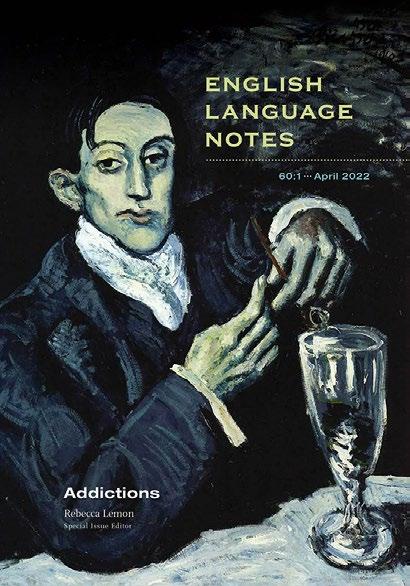
Archives of Asian Art
Patricia Berger, editor Two issues annually
boundary 2 an international journal of literature and culture Paul A. Bové, editor Quarterly
Camera Obscura
Feminism, Culture, and Media Studies
Lalitha Gopalan, Lynne Joyrich, Homay King, Bliss Cua Lim, Constance Penley, Tess Takahashi, Patricia White, and Sharon Willis, editors
Three issues annually
The Collected Letters of Thomas and Jane Welsh Carlyle
Ian Campbell and David R. Sorensen, senior editors
Katherine Inglis, Brent E. Kinser, Jane Roberts, and Liz Sutherland , editors Annual
Common Knowledge
Jeffrey M. Perl, editor
Three issues annually
Comparative Literature
Michael Allan, editor Quarterly
Comparative Studies of South Asia, Africa and the Middle East Manan Ahmed, Marwa Elshakry and Steven Pierce, editors
Three issues annually
Critical AI
Lauren M.E. Goodlad, editor
Two issues annually
Critical Times
Interventions in Global Critical Theory
Samera Esmeir, editor Three issues annually Open access
Cultural Politics
Ryan Bishop, Mark Featherstone, Eva H. Giraud, and Douglas Kellner, editors Three issues annually
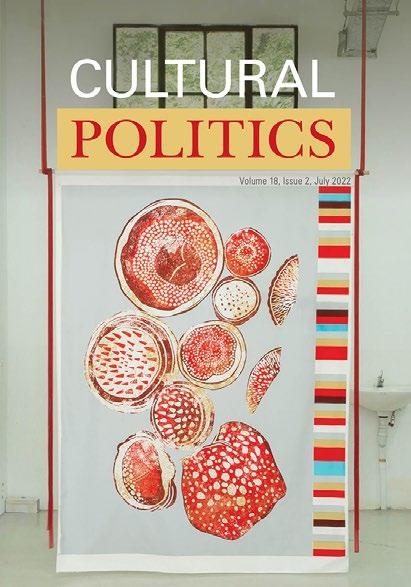
Demography
Sara R. Curran, editor Six issues annually Open access Official journal of the Population Association of America
differences
A Journal of Feminist Cultural Studies Elizabeth Weed and Ellen Rooney, editors Three issues annually
Duke Mathematical Journal
Alexander Kiselev and Richard Hain, editor Eighteen issues annually
Eighteenth-Century Life
Cedric D. Reverand II and Michael Edson, editors Three issues annually
English Language Notes
Nan Goodman, editor
Two issues annually
Environmental Humanities
Dolly Jørgensen and Franklin Ginn, editors
Three issues annually Open access
Ethnohistory
Kathryn Magee Labelle and Robert C. Schwaller, editors Quarterly Official journal of the American Society for Ethnohistory
French Historical Studies
Christine Haynes and Jennifer Ngaire Heuer, editors Quarterly Official journal of the Society for French Historical Studies
Genre
Forms of Discourse and Culture James Zeigler, editor Three issues annually
GLQ
A Journal of Lesbian and Gay Studies

Chandan Reddy and C. Riley Snorton, editors Quarterly
Hispanic American Historical Review
Lauren H. Derby, Katherine M. Marino, Fernando Pérez-Montesinos, William Summerhill, and Kevin Terraciano, editors Quarterly
History of Political Economy
Kevin D. Hoover, editor Five issues annually, plus annual supplement
History of the Present
A Journal of Critical History Joan Wallach Scott and Brian Connolly, editors Two issues annually
Illinois Journal of Mathematics Steven Bradlow, editor Quarterly
Journal of Asian Studies
Joseph S. Alter, editor Quarterly
Journal of Chinese Literature and Culture
Xingpei Yuan and Zong-qi Cai, editors Two issues annually
journal subscriptions 48
Journal of Health Politics, Policy and Law
Jonathan Oberlander, editor
Six issues annually
Journal of Korean Studies
Jisoo M. Kim, editor
Two issues annually
Journal of Medieval and Early Modern Studies
David Aers and Sarah Beckwith, editors Michael Cornett, managing editor
Three issues annually
Journal of Middle East Women’s Studies
Soha Bayoumi, editor
Three issues annually Official journal of the Association for Middle East Women’s Studies
Journal of Music Theory
Richard Cohn, editor
Two issues annually
Kyoto Journal of Mathematics
Koji Fujiwara and Atsushi Moriwaki, editors Quarterly
Labor Studies in Working-Class History
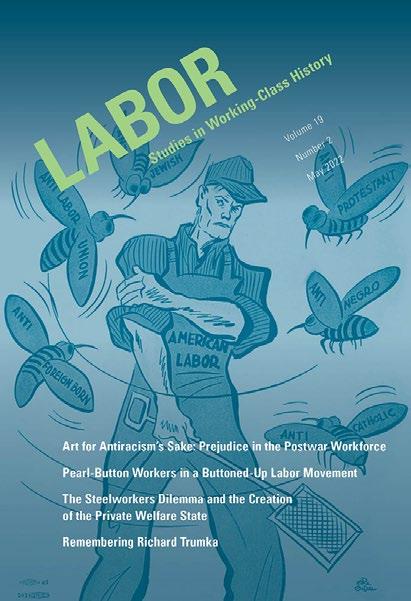
Leon Fink, editor Quarterly Official journal of the Labor and Working-Class History Association
liquid blackness journal of aesthetics and black studies
Alessandra Raengo and Lauren McLeod Cramer, editors
Two issues annually Open access
Meridians
feminism, race, transnationalism Ginetta E. B. Candelario, editor
Two issues annually the minnesota review a journal of creative and critical writing Janell Watson, editor
Two issues annually
Modern Language Quarterly
A Journal of Literary History Jeffrey Todd Knight, editor Quarterly
New German Critique
An Interdisciplinary Journal of German Studies NGC Editorial Collective, editors
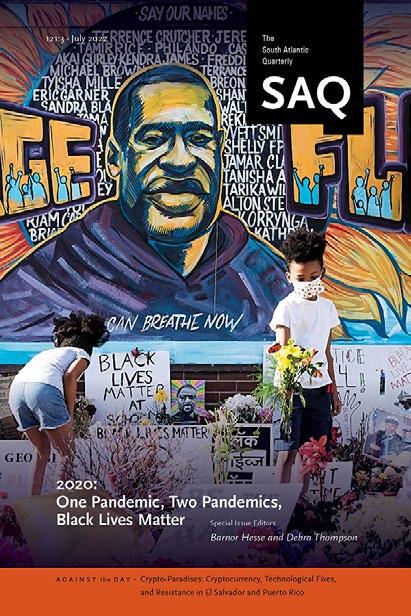
Three issues annually Nka Journal of Contemporary African Art Salah M. Hassan and Chika Okeke-Agulu, editors Two issues annually
Notre Dame Journal of Formal Logic
Curtis Franks and Anand Pillay, editors Quarterly
Novel A Forum on Fiction Nancy Armstrong, editor
Three issues annually Official journal of the Society for Novel Studies
Pedagogy
Critical Approaches to Teaching Literature, Language, Composition, and Culture Jennifer L. Holberg and Marcy M. Taylor, editors Three issues annually
The Philosophical Review
Faculty of the Sage School of Philosophy at Cornell University, editors Quarterly
Poetics Today
International Journal for Theory and Analysis of Literature and Communication Milette Shamir and Irene Tucker, editors Quarterly positions asia critique Tani Barlow and Suzy Kim, editors Quarterly
Prism Theory and Modern Chinese Literature Zong-qi Cai, editor
Three issues annually
Public Culture
Arjun Appadurai and Erica Robles-Anderson, editors
Three issues annually
Qui Parle
Critical Humanities and Social Sciences Editorial Board of Qui Parle, editors
Two issues annually
Radical History Review
RHR Editorial Collective, editors
Three issues annually
Romanic Review
Elisabeth Ladenson, editor Three issues annually
Small Axe
A Caribbean Journal of Criticism David Scott, editor Three issues annually
Social Text
Jayna Brown and David Sartorius, editors Quarterly
South Atlantic Quarterly Michael Hardt, editor Quarterly
Sungkyun Journal of East Asian Studies Ross King, editor Two issues annually Open access
Theater
Tom Sellar, editor Three issues annually
Trans Asia Photography
Deepali Dewan, Yi Gu, and Thy Phu, editors
Two issues annually Open access
TSQ: Transgender Studies Quarterly
Susan Stryker, micha cárdenas, Francisco J. Galarte, Jules Gill-Peterson, and Abraham B. Weil, editors Quarterly
Twentieth-Century Literature
Lee Zimmerman, editor Quarterly
Ordering Information
Duke University Press journals are available to bookstores through standing order; call 888.651.0122. For information on ordering indi vidual subscriptions (including postage rates for subscriptions outside of the United States) or to order individual back issues, call 888.651.0122 (within the United States and Canada) or +1 919.688.5134, or email subscriptions@dukeupress.edu.
journal subscriptions
49
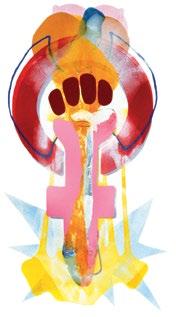



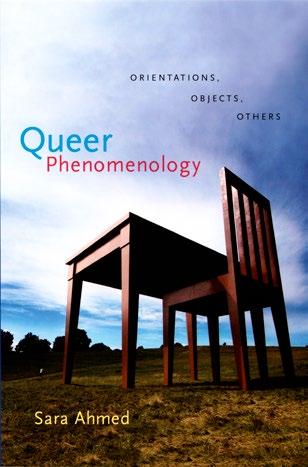


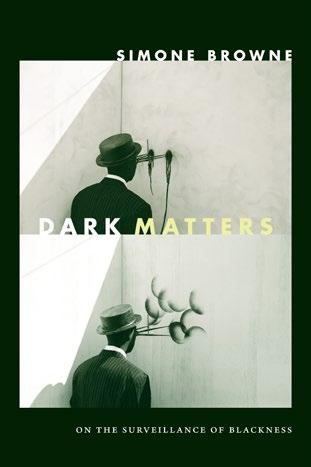




selected backlist Living a Feminist Life Sara ahmed “Everyone should read this book. —bell hooks B row n i ng Th e at urist s t he miniaturists Barbara Browning THE CUBA READER Aviva Chomsky, Barry Carr, Alfredo Prieto, and Pamela Maria Smorkaloff, editors History, Culture, Politics second edition, revised and updated ELI CLARE GRAPPLING WITH CURE Brilliant Imperfection COMPLAINT ! SARA AHMED Complaint! is precisely the text we need at this moment”—Angela Y. Davis 2021, paper $29.95/£25.99 978-1-4780-1771-4 Lost in the Game A Book about Basketball Thomas Beller ON THE INCONVENIENCE OF OTHER PEOPLE lauren berlant There’s a disco ball between us a theory of Black gay life / Jafari S. Allen 2017, paper $27.95/£23.99 978-0-8223-6319-4 2012, paper $25.95/£21.99 978-0-8223-5236-5 2006, paper $25.95/£21.99 978-0-8223-3914-4 2022, paper $30.95/£26.99 978-1-4780-1459-1 2022, paper $22.95tr/ 978-1-4780-1883-4 Rights: North America only 2022, paper $25.95/£21.99 978-1-4780-1845-2 2011, paper $25.95/£21.99 978-0-8223-5111-5 2015, paper $25.95/£21.99 978-0-8223-5938-8 2022, paper $21.95tr/£18.99 978-1-4780-1891-9 2019, paper $32.95tr/£27.99 978-1-4780-0393-9 2017, paper $23.95tr/£20.99 978-0-8223-6287-6 50
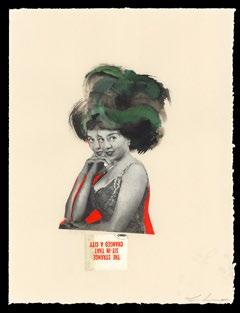

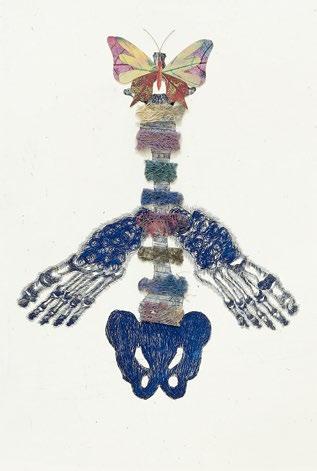
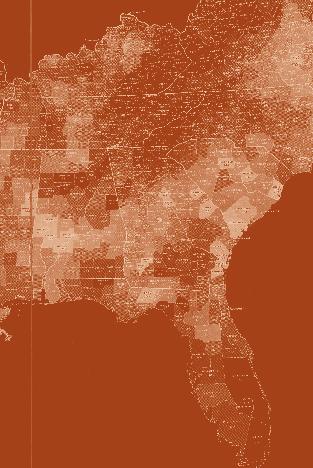
















selected backlist JASMINE NICHOLE COBB THE ART AND TEXTURE OF BLACK HAIR Stuart Hall SELECTED WRITINGS ON RACE AND DIFFERENCE Edited by Paul Gilroy and Ruth Wilson Gilmore PatriciaHillCollins CRITISOCIAL CAL THEORY AS Staying with Trouble the Making Kin Donna J. Haraway in the Chthulucene THULANI DAVIS “A masterpiece.” Robin D. G. Kelley THE EMANCI–PATION CIRCUIT BLACK ACTIVISM FORGING A CULTURE OF FREEDOM Magical Habits Monica Huerta ROADRUNNER JOSHUA CLOVER A SONG BY JONATHAN RICHMAN & THE MODERN LOVERS 2021, paper $19.95tr/£16.99 978-1-4780-1439-3 2021, paper $31.95/£27.99 978-1-4780-1166-8 2022, paper $25.95/£21.99 978-1-4780-1907-7 2016, paper $27.95/£23.99 978-0-8223-6224-1 2019, paper $29.95/£25.99 978-1-4780-0646-6 2021, paper $24.95tr/£21.99 978-1-4780-1417-1 2022, paper $28.95tr/£24.99 978-1-4780-1819-3 Winners, Losers, Friends, and Enemies on the New Terrain of Veterans Affairs VETERANS OUR Suzanne Gordon, Steve Early, and Jasper Craven 2022, paper $24.95tr/£21.99 978-1-4780-1854-4 THE HAITI READER Laurent Dubois, Kaiama L. Glover, Nadève Ménard, Millery Polyné, and Chantalle F. Verna, editors History, Culture, Politics All about Your Eyes SHARON FEKRAT MD, TANYA S GLASER MD, AND HENRY L. FENG MD, EDITORS SECOND EDITION, REVISED AND UPDATED “An essential, reasonably priced resource for junior-high, high school, and public libraries, nursing homes, and hospital reference shelves.” BOOKLIST Lee Bad Edelman Education Why Queer Theory Teaches Us Nothing Coming of Age in the Sixties John D’Emilio Memories of a Gay Catholic Boyhood 2022, cloth $29.95tr/£25.99 978-1-4780-1592-5 2020, paper $29.95tr/£25.99 978-1-4780-0677-0 2021, paper $25.95tr/£21.99 978-1-4780-1160-6 2023, paper $28.95/£24.99 978-1-4780-1862-9 51






















selected backlist Gilbert M. Joseph and Timothy J. Henderson, editors Second Edition, Revised and Updated History, Culture, Politics THE MEXICO READER Subversive Habits Shannen Dee Williams Black Catholic Nuns in the Long African American Freedom Struggle MBEMBE ACHILLE POLITICS NECRO ALEXANDER WOLFF WT E N TIETHANN VERSARY E D NOIT Rev e & a de 20 A BASKETBALL ADVENTURE KATHERINE M c KITTRICK and Other Stories DEA R SCIENC E Yan Lianke DISCOVERING FICTION TRANSLATED AND WITH AN INTRODUCTION BY CARLOS ROJAS FUNDED THE INCITE! Beyond the Non-Profit Industrial Complex REVOLUTION With a NEW PREFACE and a NEW FOREWORD $ WILL NOT BE 2017, paper $23.95tr/£20.99 978-0-8223-6900-4 2022, paper $29.95/£25.99 978-1-4780-1820-9 2022, paper $31.95tr/£27.99 978-1-4780-1836-0 2022, paper $24.95tr 978-1-4780-1880-3 Rights: North America only 2019, paper $25.95/£21.99 978-1-4780-0651-0 Rights, World excluding Southern Africa 2022, paper $23.95tr/£20.99 978-1-4780-1830-8 2021, paper $24.95/£21.99 978-1-4780-1104-0 or, on being the other woman Simone White 2022, paper/ $17.95tr/£14.99 978-1-4780-1846-9 BLACK DISABILITY POLITICS SAMI SCHALK philosophy forspidersonthe lowtheoryofkathyacker mckenzie wark CHRISTINA SHARPE In the Wake On Blackness and Being Sands Orrin H. Pilkey Norma J. Longo William J. Neal Keith C. Pilkey LOSING BEACHES TO MINING Vanishing 2022, paper $25.95tr/£21.99 978-1-4780-1879-7 2022, paper $24.95/£21.99 978-1-4780-2500-9 2021, paper $21.95tr/£18.99 978-1-4780-1468-3 2016, paper $24.95tr/£21.99
52
978-0-8223-6294-4
sales information
All prices and discounts are subject to change without notice. Books are short discount except when tr, indicating trade discount, follows the price.
Returns
No authorization is required. Books in saleable condition will be credited at full invoice price if returned within two years of invoice date. Invoice informa tion is required. Books returned beyond this time period or those returned with out invoice information will be cred ited at 50% of list price. Permanently defaced books, for example, those marred by non-removable labels, do not meet the necessary criteria and will not be accepted. Books received in damaged or defective condition must be returned within 90 days, and the reason for the return must be clearly stated in order to receive full credit.
Please Send Returns To:
Duke University Press Warehouse 120 Golden Drive Durham, NC 27705
Orders and Inquiries
For orders: phone 888-651-0122 fax 888-651-0124 8:30–4:30 Eastern Time orders@dukeupress.edu
For editorial and other matters: phone 919-687-3600 8:30–5:00 Eastern Time
Libraries
Libraries and institutions will be billed on receipt of official purchase order.
Examination and Desk Copies
For exam or desk copies, place your request through the book or journal issue’s page on our website.
Review Copies
Book review editors and members of the media can request review copies at dukeu.press/ReviewCopy or by emailing bpublicity@dukeupress.edu.
International Licensing Inquiries
booktranslations@dukeupress.edu
Mailing Opt Out
To opt out of mailings from Duke University Press, contact orders@dukeupress.edu.
Sales Representation
EASTERN AND WESTERN US Columbia University Press Sales Consortium
Catherine Hobbs, Sales Consortium Manager phone 804-690-8529 ch2714@columbia.edu
MIDWESTERN US Miller Trade Book Marketing Bruce Miller phone 773-275-8156 cell 773-307-3446 bruce@millertrade.com
CANADA
Lexa Publishers’ Representatives Mical Moser phone 718-781-2770 micalmoser@me.com
Fulfillment and Distribution University of Toronto Press Distribution Division 5201 Dufferin Street Toronto, ON M3H 5T8 Tel: 416-667-7791 Fax: 416-667-7832 Toll Free: 1-800-565-9523 Toll Free Fax: 1-800-221-9985 utpbooks@utpress.utoronto.ca
ALL OTHER INTERNATIONAL SALES AND DISTRIBUTION
Combined Academic Publishers, Ltd. (CAP) phone 44 (0) 1423 526350 combinedacademic.co.uk enquiries@combinedacademic.co.uk (Books are stocked in the UK and are available at sterling prices.)
index
Adams, Vincanne 15, 27 Allison, Anne 16
Aranke, Sampada 21 Barrera, Magdalena L. 5 Beutin, Lyndsey P. 41 Biehl, João 27 Boer, Nienke 45 Bradley, Cisco 8 Cabrera, Lydia 17 Calirman, Claudia 12 Canham, Hugo ka 21
Castañeda, Michelle 34 Celermajer, Danielle 32 Chalfin, Brenda 31 Chao, Sophie 32 Chatterjee, Moyukh 28 Cheah, Pheng 41 Chen, Mel Y. 19
Clutario, Genevieve Alva 42 Cohen, Brianne 23 Cohen, Ed 6
Cohen, Lara Langer 33 Coráñez Bolton, Sony 20 Decena, Carlos Ulises 19
Diaz, Josen Masangkay 42 Dietrich, René 43 Dokumacı, Arseli 20 Evans, Jennifer V. 37 Fassin, Didier 44 Feldman, Leah 47 Ferguson, Kathy E. 45 Fischer, Michael M. J. 29 LaFleur, Greta 40 Freeman, Lindsey A. 3 Fregoso, Rosa-Linda 10 Ghosh, Bishnupriya 24 Golestaneh, Seema 31 Hargraves, Hunter 24 Hau, Caroline S. 41 Hayden, Cori 26 Hobart, Hi'ilei Julia Kawehipuaakahaopulani 25 Hulsether, Lucia 34 Jones, C. J. 40 Kafer, Alison 19
Kahan, Benjamin 40 Kaufman-Osborn, Timothy V. 5 Kelly, Jennifer Lynn 35
Khan, Naveeda 28 Kibbey, Tyler 38 Kim, Eunjung 19 Knopf, Kerstin 43 Kong, Travis S. K. 40 Korkman, Zeynep K. 36 Lamoreaux, Janelle 27 Liu, Petrus 38 Masco, Joseph 30 McCleary, Bryce 38 Minich, Julie Avril 19 Mitchell, Lisa 29 Moultrie, Monique 18 Muehlebach, Andrea 32 Mufti, Aamir R. 47 Nash, Mark 14
Negrón-Gonzales, Genevieve 5 Ortner, Sherry B. 14 Oza, Rupal 36 Paxson, Heather 26 Plaster, Joseph 37 Raley, Rita 46 Rarey, Matthew Francis 22 Rexhepi, Piro 46
Rhee, Jennifer 46
Rivers, Chérie N. 22
Rodríguez, Juana María 9 Ruiz-Serna, Daniel 30
Russo, Joseph C. 33
Schaberg, Christopher 2 Schoonmaker, Trevor 13
Shomali, Mejdulene Bernard 35 Sinclair, Stewart Lawrence 4 Smirnova, Michelle 44
Smith, Faith 18
Steinmetz, George 44 Swarr, Amanda Lock 39 Sweeney, Megan 7 Taylor, Timothy D. 25
Thomas, Deborah A. 30
Travers 40
Vernallis, Carol 23
Walsh, Catherine E. 11 Wark, McKenzie 1
Yannakakis, Yanna 43







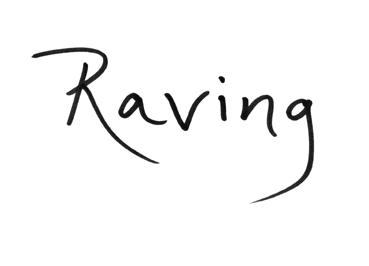








Box 90660 Durham, North Carolina 27708–0660 dukeupress.edu
Announcing a new series: Practices
Nonprofit Organization US Postage PAID Durham, NC Permit No. 1055


 MCKENZIE WARK
MCKENZIE WARK













 ANDER MONSON, author of Predator: A Memoir, A Movie, an Obsession
ANDER MONSON, author of Predator: A Memoir, A Movie, an Obsession















 CATHERINE E. WALSH
CATHERINE E. WALSH












 MARK NASH
MARK NASH


 A series edited by Vincanne Adams and João Biehl
A series edited by Vincanne Adams and João Biehl
 Also by Vincanne Adams
Also by Vincanne Adams







 HUGO KA CANHAM
HUGO KA CANHAM




















 C. RUSSO
C. RUSSO


 LYNN KELLY
LYNN KELLY








 PHENG CHEAH and CAROLINE S. HAU, editors
PHENG CHEAH and CAROLINE S. HAU, editors




















































































